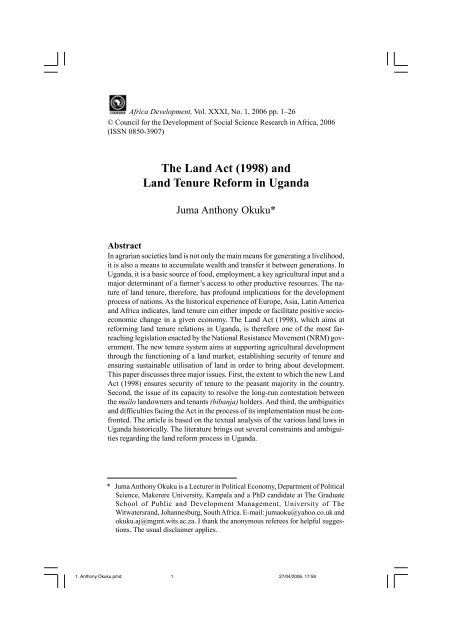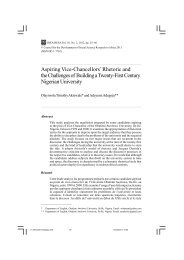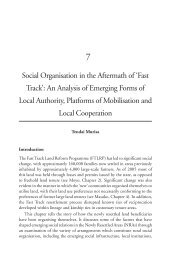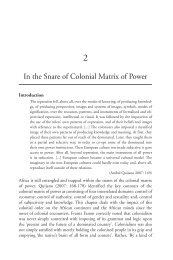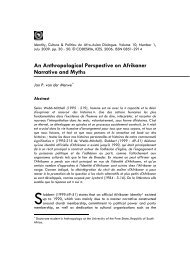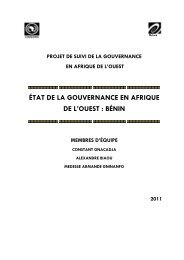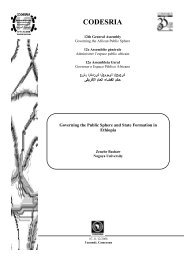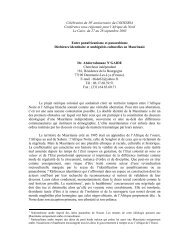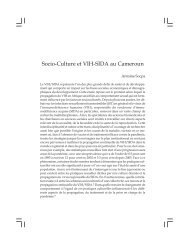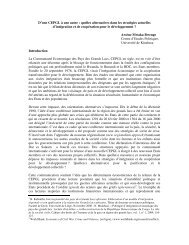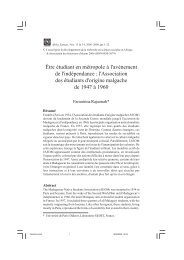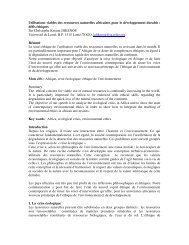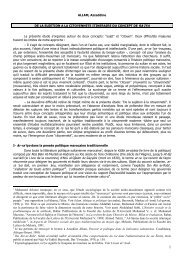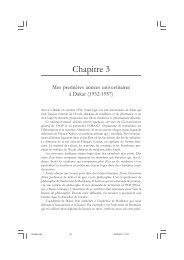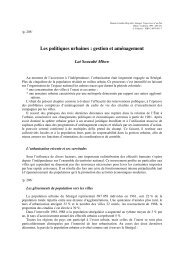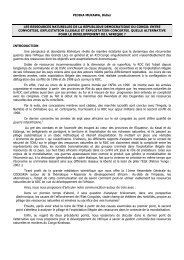and Land Tenure Reform in Uganda - codesria
and Land Tenure Reform in Uganda - codesria
and Land Tenure Reform in Uganda - codesria
You also want an ePaper? Increase the reach of your titles
YUMPU automatically turns print PDFs into web optimized ePapers that Google loves.
Africa Development, Vol. XXXI, No. 1, 2006 pp. 1–26<br />
© Council for the Development of Social Science Research <strong>in</strong> Africa, 2006<br />
(ISSN 0850-3907)<br />
The L<strong>and</strong> Act (1998) <strong>and</strong><br />
L<strong>and</strong> <strong>Tenure</strong> <strong>Reform</strong> <strong>in</strong> Ug<strong>and</strong>a<br />
Juma Anthony Okuku*<br />
Abstract<br />
In agrarian societies l<strong>and</strong> is not only the ma<strong>in</strong> means for generat<strong>in</strong>g a livelihood,<br />
it is also a means to accumulate wealth <strong>and</strong> transfer it between generations. In<br />
Ug<strong>and</strong>a, it is a basic source of food, employment, a key agricultural <strong>in</strong>put <strong>and</strong> a<br />
major determ<strong>in</strong>ant of a farmer’s access to other productive resources. The nature<br />
of l<strong>and</strong> tenure, therefore, has profound implications for the development<br />
process of nations. As the historical experience of Europe, Asia, Lat<strong>in</strong> America<br />
<strong>and</strong> Africa <strong>in</strong>dicates, l<strong>and</strong> tenure can either impede or facilitate positive socioeconomic<br />
change <strong>in</strong> a given economy. The L<strong>and</strong> Act (1998), which aims at<br />
reform<strong>in</strong>g l<strong>and</strong> tenure relations <strong>in</strong> Ug<strong>and</strong>a, is therefore one of the most farreach<strong>in</strong>g<br />
legislation enacted by the National Resistance Movement (NRM) government.<br />
The new tenure system aims at support<strong>in</strong>g agricultural development<br />
through the function<strong>in</strong>g of a l<strong>and</strong> market, establish<strong>in</strong>g security of tenure <strong>and</strong><br />
ensur<strong>in</strong>g susta<strong>in</strong>able utilisation of l<strong>and</strong> <strong>in</strong> order to br<strong>in</strong>g about development.<br />
This paper discusses three major issues. First, the extent to which the new L<strong>and</strong><br />
Act (1998) ensures security of tenure to the peasant majority <strong>in</strong> the country.<br />
Second, the issue of its capacity to resolve the long-run contestation between<br />
the mailo l<strong>and</strong>owners <strong>and</strong> tenants (bibanja) holders. And third, the ambiguities<br />
<strong>and</strong> difficulties fac<strong>in</strong>g the Act <strong>in</strong> the process of its implementation must be confronted.<br />
The article is based on the textual analysis of the various l<strong>and</strong> laws <strong>in</strong><br />
Ug<strong>and</strong>a historically. The literature br<strong>in</strong>gs out several constra<strong>in</strong>ts <strong>and</strong> ambiguities<br />
regard<strong>in</strong>g the l<strong>and</strong> reform process <strong>in</strong> Ug<strong>and</strong>a.<br />
* Juma Anthony Okuku is a Lecturer <strong>in</strong> Political Economy, Department of Political<br />
Science, Makerere University, Kampala <strong>and</strong> a PhD c<strong>and</strong>idate at The Graduate<br />
School of Public <strong>and</strong> Development Management, University of The<br />
Witwatersr<strong>and</strong>, Johannesburg, South Africa. E-mail: jumaoku@yahoo.co.uk <strong>and</strong><br />
okuku.aj@mgmt.wits.ac.za. I thank the anonymous referees for helpful suggestions.<br />
The usual disclaimer applies.<br />
1. Anthony Okuku.pmd 1<br />
27/04/2006, 17:59
2 Africa Development, Vol. XXXI, No. 1, 2006<br />
Résumé<br />
Dans les sociétés agraires, la terre ne représente pas uniquement le pr<strong>in</strong>cipal moyen<br />
de génération de revenus, mais également un outil d’accumulation et de transfert<br />
de richesses entre les différentes générations. En Oug<strong>and</strong>a, elle constitue une<br />
source majeure de ressources alimentaires, d’emploi ; elle représente un important<br />
outil agricole a<strong>in</strong>si qu’un important déterm<strong>in</strong>ant de l’accès des paysans aux<br />
autres ressources productives. La nature de la terre a de ce fait d’énormes implications<br />
sur le processus de développement des nations. Comme le démontre<br />
l’expérience historique de l’Europe, de l’Asie, de l’Amérique Lat<strong>in</strong>e et de<br />
l’Afrique, le régime foncier peut soit fre<strong>in</strong>er soit faciliter un changement<br />
socioéconomique dans une société donnée. La L<strong>and</strong> Act (1998) – loi relative au<br />
régime foncier dont l’objectif est de réformer le système foncier en Oug<strong>and</strong>a,<br />
constitue donc une des législations les plus complètes promulguées par le<br />
Gouvernement du Mouvement de Résistance Nationale (NRM). Ce nouveau<br />
système vise à apporter un certa<strong>in</strong> soutien au développement agricole à travers<br />
l’<strong>in</strong>stauration d’un marché foncier, qui assurerait a<strong>in</strong>si une certa<strong>in</strong>e sécurité foncière<br />
a<strong>in</strong>si qu’une utilisation viable de la terre, af<strong>in</strong> de faciliter le processus de<br />
développement. Cet article aborde trois po<strong>in</strong>ts majeurs. Tout d’abord il explique<br />
dans quelle mesure la nouvelle L<strong>and</strong> Act (1998) peut garantir la sécurité foncière<br />
à une majorité de paysans de ce pays. Il aborde également la question de la capacité<br />
de cette loi à résoudre le long conflit entre les propriétaires terriens mailo et les<br />
fermiers à bail bibanja. Troisièmement, cet article affirme que les ambiguïtés et<br />
les difficultés auxquelles cette loi est confrontée doivent être prises en compte.<br />
Cet article est basé sur une analyse textuelle des différentes législations foncières<br />
de l’histoire de l’Oug<strong>and</strong>a. La littérature exploitée révèle un certa<strong>in</strong> nombre de<br />
contra<strong>in</strong>tes et d’ambiguïtés concernant le processus de réforme foncière de ce<br />
pays.<br />
Introduction<br />
There is a broad agreement among economic historians that the ‘agricultural<br />
revolutions’ co<strong>in</strong>cided or even preceded the <strong>in</strong>dustrial revolution <strong>in</strong> European<br />
countries. The transfer of l<strong>and</strong> to <strong>in</strong>dividual owners as a result of the<br />
enclosure movement <strong>in</strong> Engl<strong>and</strong> led to the mechanisation of agriculture, result<strong>in</strong>g<br />
<strong>in</strong> <strong>in</strong>creased production. Virtually all successful l<strong>and</strong> reforms <strong>in</strong> the<br />
20th century <strong>in</strong>volved transfer or consolidation of l<strong>and</strong> to tenants <strong>and</strong> peasants<br />
who thus became owner-cultivators (Skarste<strong>in</strong> 1990:2-5). Through a<br />
distributive l<strong>and</strong> reform <strong>in</strong> East Asia the process was applied with strik<strong>in</strong>g<br />
success <strong>in</strong> areas of extreme l<strong>and</strong> hunger as <strong>in</strong> Japan, Taiwan <strong>and</strong> South Korea,<br />
their specific historical contexts notwithst<strong>and</strong><strong>in</strong>g. Small farms <strong>in</strong> these<br />
countries proved that they are unbeatable <strong>in</strong> ensur<strong>in</strong>g self-sufficiency comb<strong>in</strong>ed<br />
with food for all. This was complemented by a massive transfer of<br />
resources for rural development. It is usually argued that such reforms are<br />
1. Anthony Okuku.pmd 2<br />
27/04/2006, 17:59
Okuku : The L<strong>and</strong> Act (1998) <strong>and</strong> L<strong>and</strong> <strong>Tenure</strong> <strong>Reform</strong> <strong>in</strong> Ug<strong>and</strong>a<br />
favourable to efficiency <strong>and</strong> employment as well as equity. In the short-run,<br />
the size of the marketed surplus would also be favoured.<br />
Through the l<strong>and</strong> reform of 1946, for <strong>in</strong>stance, Japanese farmers received<br />
a new <strong>in</strong>centive to <strong>in</strong>tensify their productive efforts when they became owners<br />
of the l<strong>and</strong>. Farmers received a new motivation to make better use of<br />
science <strong>and</strong> technology through improved education, agricultural research,<br />
<strong>and</strong> extension comb<strong>in</strong>ed with re-organisation of co-operatives. In both South<br />
Korea <strong>and</strong> Taiwan, absentee l<strong>and</strong> ownership was abolished <strong>and</strong> the l<strong>and</strong> was<br />
placed <strong>in</strong> the h<strong>and</strong>s of cultivators.<br />
Ug<strong>and</strong>a’s economy be<strong>in</strong>g predom<strong>in</strong>antly agricultural-based with over 80<br />
percent of its people deriv<strong>in</strong>g their livelihood directly from l<strong>and</strong>, tenure security<br />
that provides for legalised exploitation of this resource is a critical<br />
need. This is because secure property rights have a positive impact on <strong>in</strong>creased<br />
agricultural production <strong>and</strong> implications for food security. In terms<br />
of the l<strong>and</strong> question, several processes related to the economic crisis <strong>and</strong><br />
Structural Adjustment Programmes (SAPs) have led to changes <strong>in</strong> dem<strong>and</strong>,<br />
use <strong>and</strong> value of l<strong>and</strong> <strong>in</strong> the country. The nature of access, the rights to l<strong>and</strong>,<br />
<strong>in</strong>clud<strong>in</strong>g the right to sell, have changed <strong>and</strong> become complex. This has been<br />
facilitated, partially, by the deepen<strong>in</strong>g poverty occasioned by some of the<br />
SAPs. An act to reform l<strong>and</strong> is therefore timely. One of the major milestones<br />
to reform l<strong>and</strong> tenure <strong>in</strong> Ug<strong>and</strong>a has been the 1998 L<strong>and</strong> Act.<br />
The L<strong>and</strong> Act of 1998, which provides for a l<strong>and</strong> tenure reform, has farreach<strong>in</strong>g<br />
implications for agricultural development. It aims at support<strong>in</strong>g<br />
agricultural development through the function<strong>in</strong>g of a l<strong>and</strong> market, establish<strong>in</strong>g<br />
security of tenure, <strong>and</strong> ensur<strong>in</strong>g the susta<strong>in</strong>able utilisation of l<strong>and</strong> to<br />
br<strong>in</strong>g about development. Susta<strong>in</strong>ability of l<strong>and</strong> reform calls for the creation<br />
of conditions for efficient use <strong>and</strong> development of l<strong>and</strong> markets meet<strong>in</strong>g the<br />
requirement of society <strong>and</strong> <strong>in</strong>dividual citizens. This entails the development<br />
of adm<strong>in</strong>istration of the cadastre, l<strong>and</strong> appraisal for taxation purposes, control<br />
over use of l<strong>and</strong>, l<strong>and</strong> use plann<strong>in</strong>g <strong>and</strong> monitor<strong>in</strong>g functions.<br />
The l<strong>and</strong> question is immersed <strong>in</strong> the political economy of Ug<strong>and</strong>a. The<br />
exercise of power <strong>and</strong> power relations imp<strong>in</strong>ges on the operations of l<strong>and</strong><br />
markets, on security <strong>in</strong> l<strong>and</strong> rights, <strong>and</strong> on security <strong>in</strong> l<strong>and</strong> tenure. There are<br />
a number of problems associated with exercise of power <strong>in</strong> Ug<strong>and</strong>a today.<br />
First, of particular concern, is the prevalence of patronage politics <strong>in</strong> Ug<strong>and</strong>a<br />
where every development programme is viewed <strong>in</strong> terms of exp<strong>and</strong><strong>in</strong>g the<br />
regime’s political base. Hence, a programme of tenure reform is viewed as<br />
an opportunity more for the expansion of the political base of the regime<br />
than for ensur<strong>in</strong>g tenure security. Public l<strong>and</strong> is likely to be used as a patronage<br />
resource for the state to acquire more power. Second, the l<strong>and</strong> reform<br />
1. Anthony Okuku.pmd 3<br />
27/04/2006, 17:59<br />
3
4 Africa Development, Vol. XXXI, No. 1, 2006<br />
process is hardly l<strong>in</strong>ked to other programmes such as the Plan for Modernisation<br />
of Agriculture (PMA), which is part of Ug<strong>and</strong>a’s broader strategy to<br />
eradicate poverty under the guidel<strong>in</strong>es of the Poverty Eradication Action<br />
Plan (PEAP) adopted by Government <strong>in</strong> 1997. 1 Third, is the problem of<br />
susta<strong>in</strong>ability of the reform process <strong>and</strong> <strong>in</strong>stitutions.<br />
This paper critically exam<strong>in</strong>es the efficacy of the L<strong>and</strong> Act of 1998, aimed<br />
at br<strong>in</strong>g<strong>in</strong>g about l<strong>and</strong> tenure reform <strong>in</strong> the context of Ug<strong>and</strong>a’s political<br />
economy. The paper is divided <strong>in</strong>to five parts. Part one is the <strong>in</strong>troduction.<br />
Part two briefly outl<strong>in</strong>es the conceptual framework. Part three locates the<br />
study <strong>in</strong> historical perspective. Part four is the central part of the paper, which<br />
exam<strong>in</strong>es both theoretically <strong>and</strong> empirically, the provisions of the Act on the<br />
l<strong>and</strong> hold<strong>in</strong>g system, control of l<strong>and</strong> use <strong>and</strong> l<strong>and</strong> management. This is done<br />
together with an analysis of chapter 15 of the Ug<strong>and</strong>a Constitution (1995)<br />
that deals with l<strong>and</strong> <strong>and</strong> environment. All these are analysed with<strong>in</strong> the context<br />
of the mission of the Act to create a l<strong>and</strong> market, establish security of<br />
tenure, <strong>and</strong> ensure the susta<strong>in</strong>able utilisation of l<strong>and</strong> resources. Part five is<br />
an assessment of the prospects of the Act <strong>in</strong> br<strong>in</strong>g<strong>in</strong>g about development <strong>in</strong><br />
Ug<strong>and</strong>a with<strong>in</strong> the <strong>in</strong>stitutional <strong>and</strong> political context of the L<strong>and</strong> Act debate<br />
<strong>and</strong> the ambiguities embedded <strong>in</strong> the Act.<br />
Conceptual framework<br />
The current dom<strong>in</strong>ant approach to analysis of l<strong>and</strong> tenure relations is<br />
neoliberalism. This approach has been adopted by advocates of the market<br />
approach to l<strong>and</strong> reform called ‘negotiated’ or ‘market-assisted’ l<strong>and</strong> reform.<br />
Debates on l<strong>and</strong> tenure security have been focused on what forms of tenure<br />
<strong>in</strong>stitutions could provide more security, <strong>in</strong>dividualised tenure or <strong>in</strong>digenous<br />
tenure, <strong>and</strong> <strong>in</strong> what forms l<strong>and</strong> can be managed, by the state, local community<br />
or <strong>in</strong>dividuals (Bromley <strong>and</strong> Cornea 1989). What has been little discussed,<br />
however, are the contents of security <strong>and</strong> social character which security<br />
of l<strong>and</strong> rights carry. Izumi (1998b:12-13), attempts a clarification of<br />
the issues by segregat<strong>in</strong>g the contents of security <strong>and</strong> the social character of<br />
security of l<strong>and</strong> rights as opposed to security <strong>in</strong> l<strong>and</strong> tenure.<br />
Accord<strong>in</strong>g to this view, security <strong>in</strong> l<strong>and</strong> rights is attached to certa<strong>in</strong> <strong>in</strong>dividuals<br />
or groups. Security <strong>in</strong> l<strong>and</strong> rights is often relational with respect to<br />
contradict<strong>in</strong>g relations over l<strong>and</strong> between different social groups: villagers<br />
<strong>and</strong> outsiders, peasants <strong>and</strong> the state, pastoralists <strong>and</strong> private <strong>in</strong>vestors, where<br />
unequal access to l<strong>and</strong> between the two exists. In many cases, a loss of access to<br />
l<strong>and</strong> of the former is often a condition for the latter to accumulate l<strong>and</strong>.<br />
Security <strong>in</strong> l<strong>and</strong> tenure, on the other h<strong>and</strong>, implies stability <strong>in</strong> the <strong>in</strong>stitutions<br />
of l<strong>and</strong> tenure, which conta<strong>in</strong>s rules, norms <strong>and</strong> enforcement mechanisms<br />
of the rules. Legitimacy <strong>and</strong> stability <strong>in</strong> tenure <strong>in</strong>stitutions is necessary<br />
1. Anthony Okuku.pmd 4<br />
27/04/2006, 17:59
Okuku : The L<strong>and</strong> Act (1998) <strong>and</strong> L<strong>and</strong> <strong>Tenure</strong> <strong>Reform</strong> <strong>in</strong> Ug<strong>and</strong>a<br />
if <strong>in</strong>dividuals are to believe that exist<strong>in</strong>g <strong>in</strong>stitutions protect his/her rights <strong>in</strong><br />
l<strong>and</strong>. It is not the legislation of rules but their <strong>in</strong>stitutionalisation that provides<br />
a source of security <strong>in</strong> l<strong>and</strong> rights. However, security <strong>in</strong> l<strong>and</strong> tenure<br />
does not imply that everybody has secure l<strong>and</strong> rights protected by the <strong>in</strong>stitution.<br />
This is because <strong>in</strong>stitutions are not neutral, but often reflect power relations<br />
<strong>in</strong> a given society.<br />
<strong>Tenure</strong> security <strong>and</strong> security of l<strong>and</strong> rights must be seen <strong>in</strong> a given social<br />
<strong>and</strong> <strong>in</strong>stitutional context. It is not that just that secure property rights <strong>in</strong> l<strong>and</strong><br />
have a positive impact on <strong>in</strong>creased agricultural productivity as they provide<br />
<strong>in</strong>centives to <strong>in</strong>vest. This depends on whose <strong>in</strong>terests these <strong>in</strong>stitutions serve.<br />
Brenner (1982), draw<strong>in</strong>g on the experience of European development, argues<br />
that <strong>in</strong>stitutions create vested <strong>in</strong>terests that make change problematic,<br />
even <strong>in</strong> the presence of major technological advances.<br />
The major concern with the current donor-driven conceptualisation regard<strong>in</strong>g<br />
the lack of agricultural development <strong>in</strong> Africa is the absence of a<br />
l<strong>and</strong> market. In the literature on African tenure, the l<strong>and</strong> market is discussed<br />
as synonymous with l<strong>and</strong> sales <strong>and</strong> the absence of a l<strong>and</strong> market is blamed as<br />
a cause of the <strong>in</strong>efficient allocation of l<strong>and</strong> (Izumi 1998a:33). The L<strong>and</strong> Act<br />
of 1998 is <strong>in</strong>formed by this conception. This view regard<strong>in</strong>g l<strong>and</strong> markets<br />
raises two questions. First, whether exist<strong>in</strong>g l<strong>and</strong> sales <strong>in</strong> Africa, which are<br />
considered ‘<strong>in</strong>formal l<strong>and</strong> markets’, constitute a l<strong>and</strong> market. Second, whether<br />
formalisation of the ‘<strong>in</strong>formal l<strong>and</strong> market’ will ensure a more just allocation<br />
<strong>and</strong> distribution of l<strong>and</strong>.<br />
To conceptualise the l<strong>and</strong> market adequately, one needs to dist<strong>in</strong>guish<br />
between isolated, personalised, non-market exchange <strong>and</strong> impersonal market<br />
exchange. A market itself is an <strong>in</strong>stitution which depends on other <strong>in</strong>stitutions<br />
such as customary, legal, political <strong>and</strong> other social arrangements, which<br />
control market systems, <strong>and</strong> <strong>in</strong> the absence of such <strong>in</strong>stitutions, a market<br />
economy does not automatically emerge (Hodgson 1988).<br />
Therefore, the current neoliberal <strong>in</strong>dividualisation of tenure <strong>and</strong> the notion<br />
of l<strong>and</strong> markets are not adequate <strong>in</strong> societies <strong>in</strong> the process of transition<br />
such as those of Africa. There are both market <strong>and</strong> non-market forces that<br />
<strong>in</strong>fluence the process. The non-market <strong>in</strong>stitutions, particularly the state, are<br />
<strong>in</strong>dispensable for the establishment of <strong>and</strong> the proper work<strong>in</strong>g of the market.<br />
The state is largely left out of the neoliberal construction of l<strong>and</strong> markets.<br />
The <strong>in</strong>stitutionalisation of the l<strong>and</strong> market requires the state to be highly<br />
efficient <strong>in</strong> its <strong>in</strong>tervention <strong>in</strong> regulat<strong>in</strong>g <strong>and</strong> facilitat<strong>in</strong>g the development of<br />
the l<strong>and</strong> market, <strong>and</strong> <strong>in</strong> adm<strong>in</strong>istration, <strong>in</strong>clud<strong>in</strong>g property rights legislation,<br />
registration <strong>and</strong> collection of l<strong>and</strong> tax (Izumi 1998a:34).<br />
The debate on the relationship between l<strong>and</strong> tenure <strong>and</strong> development cont<strong>in</strong>ues.<br />
What is agreed, however, is that there is a need for l<strong>and</strong> reform for<br />
1. Anthony Okuku.pmd 5<br />
27/04/2006, 17:59<br />
5
6 Africa Development, Vol. XXXI, No. 1, 2006<br />
susta<strong>in</strong>able agricultural development to take place. The central element <strong>in</strong><br />
the relationship between l<strong>and</strong> tenure <strong>and</strong> development is the concrete def<strong>in</strong>ition<br />
of property rights, which are crucial for <strong>in</strong>vestment <strong>in</strong>, <strong>and</strong> development<br />
of, agriculture. L<strong>and</strong> reform, therefore, connotes reform of basic relations<br />
among tillers of the l<strong>and</strong> <strong>and</strong> of basic relations between them <strong>and</strong> the direct<br />
beneficiaries from the l<strong>and</strong>-tiller <strong>in</strong>teraction (Lipton 1991:270).<br />
Policy-makers seek<strong>in</strong>g to avoid l<strong>and</strong> reform may f<strong>in</strong>d it politically convenient<br />
to <strong>in</strong>sert provisions that make l<strong>and</strong> reform impossibly difficult; for<br />
example, by add<strong>in</strong>g extraneous requirements regard<strong>in</strong>g l<strong>and</strong> confiscation.<br />
The fear of l<strong>and</strong> reform should not at the same time allow for an over-liberal<br />
def<strong>in</strong>ition that may allow some pseudo-reforms to acquire kudos for real<br />
reform. L<strong>and</strong> reform may fail to achieve its stated goals because it does not<br />
attack the rural power structure, which may be rooted <strong>in</strong> the unequal distribution<br />
of owned l<strong>and</strong>.<br />
Second, l<strong>and</strong> markets may not necessarily be activated as a result of registration<br />
or titl<strong>in</strong>g. The mere fact that l<strong>and</strong> sales take place does not mean<br />
that they promote economic efficiency by transferr<strong>in</strong>g l<strong>and</strong> <strong>in</strong>to the h<strong>and</strong>s of<br />
dynamic cultivators. L<strong>and</strong> markets, as is the case with other types of markets,<br />
are social organisms <strong>in</strong>teract<strong>in</strong>g with <strong>and</strong> perverted by the state <strong>and</strong><br />
society at large, <strong>and</strong> are political entities permeated by power relations of a<br />
diverse k<strong>in</strong>d (White 1993). Successful negotiation <strong>and</strong> contestation <strong>in</strong> the<br />
market depends on access to power. It is therefore necessary to underst<strong>and</strong><br />
what is power, what makes power, how power is acquired, <strong>and</strong> how to exercise<br />
power <strong>in</strong> agrarian societies. Any reform of the l<strong>and</strong> tenure system must<br />
take <strong>in</strong>to consideration both the market <strong>and</strong> non-market configurations (Izumi<br />
1998a:50).<br />
Third, reform of l<strong>and</strong> tenure must go beyond titl<strong>in</strong>g <strong>and</strong> distribution of<br />
l<strong>and</strong>. There must be an agrarian reform – that is, reform of production <strong>and</strong><br />
social relations. It must <strong>in</strong>volve the provision of technology, the extension of<br />
farm management education <strong>and</strong> research, the provision of credit <strong>and</strong> the reorganisation<br />
of co-operatives, to enable farmers to participate effectively <strong>in</strong><br />
the <strong>in</strong>creas<strong>in</strong>gly hostile market based on <strong>in</strong>dividualised entry advocated by<br />
the neoliberals.<br />
F<strong>in</strong>ally, there is a theoretical case for a l<strong>and</strong> ceil<strong>in</strong>g <strong>and</strong> a l<strong>and</strong> tax. An<br />
effective distributive l<strong>and</strong> reform must <strong>in</strong>clude a l<strong>and</strong> ceil<strong>in</strong>g beyond which<br />
an <strong>in</strong>dividual may not own l<strong>and</strong>. It is an essential po<strong>in</strong>t <strong>in</strong> ensur<strong>in</strong>g a more<br />
equal ownership of l<strong>and</strong> lead<strong>in</strong>g to a fair <strong>in</strong>come distribution. L<strong>and</strong> taxation,<br />
with progressively higher rates as l<strong>and</strong> value <strong>and</strong> size of ownership hold<strong>in</strong>g<br />
<strong>in</strong>crease, will, it has been argued, provide large l<strong>and</strong>owners with the <strong>in</strong>centive<br />
to sell parts of their l<strong>and</strong> <strong>in</strong> order to escape the higher tax rates, (Mijumbi<br />
2000:10). Apart from rent<strong>in</strong>g out <strong>and</strong> sell<strong>in</strong>g parts of l<strong>and</strong>, it may encourage<br />
1. Anthony Okuku.pmd 6<br />
27/04/2006, 17:59
Okuku : The L<strong>and</strong> Act (1998) <strong>and</strong> L<strong>and</strong> <strong>Tenure</strong> <strong>Reform</strong> <strong>in</strong> Ug<strong>and</strong>a<br />
l<strong>and</strong>owners to <strong>in</strong>vest <strong>in</strong> the l<strong>and</strong> to produce more so as to raise the funds for<br />
payment of tax. When well managed, tax resources may become a source of<br />
funds to lend to farmers to make improvements <strong>in</strong> the l<strong>and</strong> <strong>and</strong> for the development<br />
of rural <strong>in</strong>frastructure. Most of these theoretical issues are largely<br />
passed over <strong>in</strong> the L<strong>and</strong> Act 1998.<br />
The l<strong>and</strong> question <strong>in</strong> Ug<strong>and</strong>a encompasses profound historical <strong>and</strong> political<br />
issues that go beyond the framework of neoliberal theory. Both forms,<br />
the market <strong>and</strong> non-market l<strong>and</strong> transactions, co-exist. The m<strong>in</strong>imal state<br />
<strong>in</strong>tervention suggested by neoliberal theory is unlikely to ensure the emergence<br />
of a l<strong>and</strong> market <strong>and</strong> its efficient function<strong>in</strong>g. A review of the history<br />
of l<strong>and</strong> legislation <strong>in</strong> Ug<strong>and</strong>a <strong>in</strong>dicates that socio-political issues have not<br />
been given sufficient consideration <strong>in</strong> the enactment of laws. Economic issues,<br />
although important, are not sufficient on their own.<br />
L<strong>and</strong> legislation <strong>in</strong> Ug<strong>and</strong>a: Historical perspectives<br />
To underst<strong>and</strong> the current efforts to reform l<strong>and</strong> tenure <strong>in</strong> Ug<strong>and</strong>a, one must<br />
look at the historical context. Most of the <strong>in</strong>tricacies <strong>in</strong>volv<strong>in</strong>g the l<strong>and</strong> tenure<br />
reform were created by past l<strong>and</strong> policies, both colonial <strong>and</strong> postcolonial.<br />
The effectiveness or failure of l<strong>and</strong> legislation can only be assessed with<strong>in</strong><br />
its past political, economic <strong>and</strong> social context. This is because the underly<strong>in</strong>g<br />
mission of past legislation, as for the Act today, was the creation of markets,<br />
the establishment of security of tenure <strong>and</strong> to ensure the susta<strong>in</strong>able<br />
utilisation of l<strong>and</strong> (Mamdani 1976; Mukubwa-Tumw<strong>in</strong>e 1977; Bazaara et al.<br />
1992; Trout 1994).<br />
The colonial government chose to <strong>in</strong>troduce <strong>in</strong>dividual rights <strong>in</strong> l<strong>and</strong> <strong>in</strong><br />
the form of freehold tenure start<strong>in</strong>g <strong>in</strong> Bug<strong>and</strong>a. The colonial state <strong>in</strong>tervention<br />
produced conditions <strong>and</strong> legal mechanisms for the emergence of l<strong>and</strong><br />
markets. Sir Harry Johnstone, the author of the 1900 Agreement between the<br />
British <strong>and</strong> Bag<strong>and</strong>a, believed that he was simply formalis<strong>in</strong>g <strong>and</strong> preserv<strong>in</strong>g<br />
traditional rights <strong>and</strong> privileges <strong>in</strong> l<strong>and</strong>, but the rights under the agreement<br />
represented a fundamental shift from the traditional system (Mukwaya<br />
1953 <strong>and</strong> West 1972). Under the terms of the1900 Agreement, of the total of<br />
19,700 square miles of the l<strong>and</strong> of Bug<strong>and</strong>a, more than 8000 square miles,<br />
the mailo, were allocated to the k<strong>in</strong>g <strong>and</strong> private <strong>in</strong>dividuals ma<strong>in</strong>ly chiefs,<br />
notables, the church <strong>and</strong> the colonial state (crown l<strong>and</strong>). Outside Bug<strong>and</strong>a,<br />
the colonial state assumed control over unappropriated l<strong>and</strong> by declar<strong>in</strong>g it<br />
crown l<strong>and</strong>s.<br />
The outcome of the two approaches to l<strong>and</strong> legislation was twofold. In<br />
Bug<strong>and</strong>a, the colonial policy consolidated the political <strong>and</strong> economic power<br />
of the chiefs <strong>and</strong> mailo 2 l<strong>and</strong>owners while at the same time render<strong>in</strong>g the<br />
Bakopi (the peasants/the poor), <strong>and</strong> tenants dependent on the l<strong>and</strong>lords. Out-<br />
1. Anthony Okuku.pmd 7<br />
27/04/2006, 17:59<br />
7
8 Africa Development, Vol. XXXI, No. 1, 2006<br />
side Bug<strong>and</strong>a, a new elite, particularly collaborators, with colonial back<strong>in</strong>g<br />
acquired l<strong>and</strong> <strong>and</strong> power that they had never possessed before. The general<br />
population <strong>in</strong> the meantime lost access to the so-called ‘unappropriated l<strong>and</strong>s’<br />
(Bazaara, et al 1992:8). At the same time, as a punishment to Bunyoro K<strong>in</strong>gdom<br />
for hav<strong>in</strong>g resisted colonialism, the colonial state settled the Bag<strong>and</strong>a,<br />
mostly as absentee l<strong>and</strong>lords, <strong>in</strong> Kibaale, which came to be known as the<br />
‘lost counties’. 3 These arrangements had serious political implications <strong>in</strong> the<br />
post-<strong>in</strong>dependence period.<br />
Our major concern here, however, is with the implications of this legislation<br />
for l<strong>and</strong> ownership <strong>and</strong> transfer. First, l<strong>and</strong> became a saleable commodity<br />
at the complete disposal of <strong>in</strong>dividuals, who had legal obligation neither<br />
to the Kabaka nor to the people settled on their l<strong>and</strong>. Second, with<strong>in</strong> a few<br />
years l<strong>and</strong> became an important commodity for <strong>in</strong>vestment <strong>and</strong> the generation<br />
of cont<strong>in</strong>uous wealth through the exploitation of hired labour with the<br />
rise of employers <strong>and</strong> employees among the <strong>in</strong>digenous population. Third,<br />
<strong>and</strong> perhaps most far-reach<strong>in</strong>g, the 1900 Agreement excluded the rest of the<br />
population from enjoy<strong>in</strong>g similar rights <strong>in</strong> l<strong>and</strong> as the chiefs <strong>and</strong> other mailo<br />
owners. Not only were they deprived of the rights of ownership ab <strong>in</strong>itio but<br />
also their right of occupancy (Mafeje 1973:6-7). Politically, this set the stage<br />
for the Bataaka movement 4 <strong>in</strong> the 1920s, which was due to the dissatisfaction<br />
with the 1900 Agreement.<br />
The mailo estates, however, did not rema<strong>in</strong> <strong>in</strong>tact, but were broken up<br />
over time, as the l<strong>and</strong> market emerged. The orig<strong>in</strong>al large mailo estates were<br />
split <strong>in</strong>to smaller lots, <strong>and</strong> the number of owners <strong>in</strong>creased. Inheritance <strong>and</strong><br />
gifts were responsible for this trend, but the l<strong>and</strong> market played a role.<br />
Mukwaya (1953:34) described sale as a primary factor responsible for the<br />
<strong>in</strong>crease <strong>in</strong> the number of l<strong>and</strong>owners. In his sample from two central region<br />
Sub-counties, 57.8 percent of l<strong>and</strong>owners had purchased their l<strong>and</strong>. As a<br />
result of divisions through <strong>in</strong>heritance, gift, <strong>and</strong> sale, there may have been as<br />
many as 200,000 owners of mailo l<strong>and</strong> by 1974 (Trout 1994:20).<br />
There were three pieces of legislation <strong>in</strong> the colonial period. First, <strong>in</strong><br />
1903, the Crown L<strong>and</strong>s Ord<strong>in</strong>ance as a forerunner of public l<strong>and</strong> policies<br />
was enacted to provide for the manner <strong>in</strong> which Crown L<strong>and</strong> hold<strong>in</strong>g emerged.<br />
This <strong>in</strong>cluded freehold <strong>and</strong> leasehold. Second, <strong>in</strong> 1908 a L<strong>and</strong> Law was passed<br />
by the Bug<strong>and</strong>a parliament, Lukiiko, def<strong>in</strong><strong>in</strong>g the system of tenure <strong>in</strong>troduced<br />
by the 1900 Agreement. It also saw the implementation of rent requirements<br />
by tenants <strong>and</strong> peasants, busulu <strong>and</strong> envujjo. The tenants <strong>and</strong><br />
peasants had to pay dues every year, busulu <strong>and</strong> a tithe, envujjo <strong>in</strong> respect of<br />
each acre. The 1920s saw agitation by the Bataaka who were dissatisfied<br />
with the Agreement, which had not specified the precise rights peasants had.<br />
At the same time, there were <strong>in</strong>creased dem<strong>and</strong>s by l<strong>and</strong>lords for cash <strong>and</strong><br />
1. Anthony Okuku.pmd 8<br />
27/04/2006, 17:59
Okuku : The L<strong>and</strong> Act (1998) <strong>and</strong> L<strong>and</strong> <strong>Tenure</strong> <strong>Reform</strong> <strong>in</strong> Ug<strong>and</strong>a<br />
commodity rents as peasants exp<strong>and</strong>ed the cultivation of cash crops. The<br />
implication of this extortion was that it acted as a fetter on production as<br />
high rents, envujjo <strong>and</strong> busulu were imposed on the tenants <strong>and</strong> peasants.<br />
Third, the colonial state responded by enact<strong>in</strong>g the 1928 envujjo <strong>and</strong> busulu<br />
laws that put a limit to the amount of rent that a l<strong>and</strong>lord could levy while<br />
guarantee<strong>in</strong>g the tenant complete <strong>and</strong> hereditary security of tenure so long as<br />
he cont<strong>in</strong>ued the effective cultivation of his l<strong>and</strong>. The state through these<br />
laws achieved three goals. First, the material basis of power of the l<strong>and</strong>lords<br />
<strong>and</strong> chiefs was severely limited. Second, it gave the peasants security of<br />
tenure provided they cultivated cash crops for export. As a result, the tenant<br />
found himself <strong>in</strong> a more secure position than before 1928 (Mamdani<br />
1976:124). In law, the security of the mukopi (peasant/tenant/poor), was protected<br />
aga<strong>in</strong>st arbitrary eviction. The chief could no longer plunder the peasant’s<br />
possessions <strong>and</strong> a law, which fixed the l<strong>and</strong>lord’s share of economic<br />
crops at a much smaller amount than which he had previously dem<strong>and</strong>ed,<br />
def<strong>in</strong>ed his obligations. However, as Mukubwa (1977:59), observes, ‘it should<br />
not be forgotten that the exploitation of the peasant was not ended, it was<br />
only checked or mitigated’. The third goal achieved by the colonial state was<br />
that the protection from eviction led to an <strong>in</strong>crease <strong>in</strong> the production of cash<br />
crops <strong>in</strong> dem<strong>and</strong> by British <strong>in</strong>dustries <strong>in</strong> the 1930s.<br />
No major l<strong>and</strong> legislation was enacted until the 1950s. In a report to the<br />
colonial Secretary of State for Colonies <strong>in</strong> 1951 by then Governor of Kenya,<br />
Phillip Mitchell, it was argued that small-scale cultivation of l<strong>and</strong> under tribal<br />
conditions of tenure <strong>and</strong> accord<strong>in</strong>g to African methods could do more than<br />
susta<strong>in</strong> subsistence. The East African Royal Commission (EARC), was set<br />
up. The Commission made three major recommendations, namely, there<br />
should be, first, a progressive encouragement of <strong>in</strong>dividualisation of the title<br />
<strong>in</strong> the African h<strong>and</strong>s. Second, there should be a correspond<strong>in</strong>g reduction of<br />
communal <strong>and</strong> other restrictive controls over African l<strong>and</strong>s. Third, a l<strong>and</strong><br />
policy that would ensure mobility <strong>in</strong> the transfer of l<strong>and</strong> <strong>in</strong> order to enable<br />
access to l<strong>and</strong> for economic use was recommended. Accord<strong>in</strong>g to Kiapi,<br />
(1975), the government proposals based on the Commission’s recommendations<br />
were rejected <strong>in</strong> some districts. In Teso <strong>and</strong> Lango riots ensued.The<br />
Commission’s recommendations rema<strong>in</strong>ed largely unimplemented.<br />
In the 1960s <strong>and</strong> 1970s, there were several pieces of l<strong>and</strong> legislations.<br />
Here I consider those that were pert<strong>in</strong>ent to the issue of security of tenure<br />
<strong>and</strong> l<strong>and</strong> acquisition. Follow<strong>in</strong>g the recommendations of the1961 Constitutional<br />
Conference, Lancaster House, London, the Public L<strong>and</strong> Act of 1962<br />
was enacted. This was an attempt to establish a clear l<strong>and</strong> policy before <strong>in</strong>dependence.<br />
The Act converted all former Crown l<strong>and</strong> <strong>in</strong>to public l<strong>and</strong>s, subject<br />
to customary tenure, without specify<strong>in</strong>g the limit to which a person could<br />
1. Anthony Okuku.pmd 9<br />
27/04/2006, 17:59<br />
9
10 Africa Development, Vol. XXXI, No. 1, 2006<br />
acquire this l<strong>and</strong>. The L<strong>and</strong> Acquisition Act of 1965 provided that the M<strong>in</strong>ister,<br />
whenever he was satisfied that the l<strong>and</strong> was needed for public purposes,<br />
could by statutory <strong>in</strong>struments make a declaration to that effect. Non-Africans<br />
were not allowed to occupy or enter <strong>in</strong>to possession of l<strong>and</strong> or make<br />
any contract to purchase or lease any l<strong>and</strong> without the consent of the M<strong>in</strong>ister,<br />
by the L<strong>and</strong> Transfer Act of 1965.<br />
The question which none of these Acts raised was; who was go<strong>in</strong>g to be<br />
the subject of rural transformation <strong>in</strong> Ug<strong>and</strong>a? A partial answer was given<br />
dur<strong>in</strong>g the 1966 crisis when the oligarchic superstructure of Bug<strong>and</strong>a was<br />
forcibly dismantled by the the government of Milton Obote, Ug<strong>and</strong>a’s first<br />
postcolonial Prime M<strong>in</strong>ister. The government, however, had no clear plan<br />
for l<strong>and</strong> reform. The most it did <strong>in</strong> Bug<strong>and</strong>a was to abolish official mailo<br />
l<strong>and</strong>, which by then amounted to no more than 4 percent of the l<strong>and</strong>, <strong>and</strong> the<br />
transfer of all public l<strong>and</strong> to the national government (Mafeje 1973:22). Put<br />
<strong>in</strong> a political context, the first Obote regime was unable to deal effectively<br />
with the oligarchy due to its lack of political organisation at the grassroots<br />
level. The regime was, as a result, conf<strong>in</strong>ed to adm<strong>in</strong>istrative manoeuvres<br />
<strong>and</strong> was extremely fearful of rebellion <strong>in</strong> Bug<strong>and</strong>a <strong>in</strong> the event of the government<br />
seriously tackl<strong>in</strong>g the sensitive l<strong>and</strong> question.<br />
The other two important l<strong>and</strong> laws <strong>in</strong> the post-<strong>in</strong>dependence period were<br />
the 1969 Public L<strong>and</strong> Act <strong>and</strong> the 1975 L<strong>and</strong> <strong>Reform</strong> Decree. In 1969, all<br />
public l<strong>and</strong> was brought under the Ug<strong>and</strong>a L<strong>and</strong> Commission. It was made<br />
lawful for persons hold<strong>in</strong>g l<strong>and</strong> by customary tenure to occupy without grant,<br />
lease or license from the controll<strong>in</strong>g authority of any public l<strong>and</strong> vested <strong>in</strong><br />
the Commission. Sub-section 24 of the 1969 Public L<strong>and</strong> Act required the<br />
consent of customary tenants before such l<strong>and</strong> could be surrendered for any<br />
other purposes. This was a vital protection for the majority who held l<strong>and</strong><br />
under this tenure.<br />
The 1975 L<strong>and</strong> <strong>Reform</strong> Decree reversed whatever security the peasants<br />
had acquired by the 1969 Public L<strong>and</strong>s Act by declar<strong>in</strong>g all l<strong>and</strong> <strong>in</strong> Ug<strong>and</strong>a<br />
to be public. The Decree had a number of declared aims. First, it aimed to<br />
end <strong>and</strong> prevent ‘unreasonable’ areas of l<strong>and</strong> be<strong>in</strong>g left undeveloped by their<br />
owners or occupiers, especially <strong>in</strong>dividuals without justification for do<strong>in</strong>g<br />
so. Second, the decree aimed at distribut<strong>in</strong>g l<strong>and</strong> use to as many people as<br />
possible, especially where there was great dem<strong>and</strong> by those who needed<br />
l<strong>and</strong> for ‘development’ projects. Third, the decree sought to provide security<br />
to l<strong>and</strong> occupiers or users but to subject them to the general <strong>in</strong>terest <strong>and</strong><br />
needs of the public. The Decree abolished mailo, freehold or any other absolute<br />
ownership rights. Absolute titles were converted <strong>in</strong>to leasehold under<br />
the Ug<strong>and</strong>a L<strong>and</strong> Commission – 99 years for <strong>in</strong>dividuals, <strong>and</strong> 999 years for<br />
public bodies, religious <strong>and</strong> other charitable organisations. The busulu <strong>and</strong><br />
1. Anthony Okuku.pmd 10<br />
27/04/2006, 17:59
Okuku : The L<strong>and</strong> Act (1998) <strong>and</strong> L<strong>and</strong> <strong>Tenure</strong> <strong>Reform</strong> <strong>in</strong> Ug<strong>and</strong>a<br />
envujjo tenants were turned <strong>in</strong>to customary holders without the condition of<br />
rent payment. They were, however, prohibited from transferr<strong>in</strong>g any title <strong>in</strong><br />
l<strong>and</strong> other than the improvements <strong>and</strong> developments on the l<strong>and</strong> <strong>and</strong> provided<br />
for eviction after a three months notice. It abolished the power of customary<br />
tenants to st<strong>and</strong> <strong>in</strong> the way of development by refus<strong>in</strong>g grants to lease<br />
to those most able to develop the l<strong>and</strong> (Bazaara, et al 1992:15).<br />
What were the implications of the 1975 Decree? The first major implication<br />
is that the Decree opened the floodgates for speculators <strong>and</strong> l<strong>and</strong> grabbers.<br />
State bureaucrats <strong>and</strong> state agents, particularly army officers, used state<br />
power to grab l<strong>and</strong>. This was because <strong>in</strong> the <strong>in</strong>flationary economy of the<br />
1970s, the durability <strong>and</strong> ability of l<strong>and</strong> to ma<strong>in</strong>ta<strong>in</strong> real value made it a<br />
desirable asset for preserv<strong>in</strong>g wealth (Juma 2000:18). Second, although the<br />
decree abolished rents, it did not dim<strong>in</strong>ish the power of the l<strong>and</strong>-own<strong>in</strong>g<br />
class, which could, on the pretext of ‘develop<strong>in</strong>g’ the l<strong>and</strong>, dispossess the<br />
tenants (Bazaara 2000:6). Third, there was no security of tenure as l<strong>and</strong> could<br />
be expropriated from the peasants <strong>in</strong> the name of ‘development’ projects or<br />
the ‘public’ <strong>in</strong>terest. In general, however, the decree had a limited impact as<br />
the average citizen rema<strong>in</strong>ed unaware of it <strong>and</strong> it rema<strong>in</strong>ed largely<br />
unimplemented.<br />
The fundamental issues emerg<strong>in</strong>g from the various l<strong>and</strong> enactments are<br />
those of security of tenure <strong>and</strong> the def<strong>in</strong>ition of property rights, which determ<strong>in</strong>e<br />
the range of possible transactions concern<strong>in</strong>g l<strong>and</strong>. They generally failed<br />
to def<strong>in</strong>e the central subject of rural transformation. This is where the L<strong>and</strong><br />
Act 1998, appears to be so different. But due to some ambiguities embedded<br />
<strong>in</strong> it, it may not be able to resolve some of the contentious issues surround<strong>in</strong>g<br />
the l<strong>and</strong> question <strong>in</strong> Ug<strong>and</strong>a.<br />
L<strong>and</strong> <strong>Reform</strong> <strong>and</strong> Policy <strong>in</strong> Ug<strong>and</strong>a<br />
By the late 1980s, there was no systematic l<strong>and</strong> policy <strong>in</strong> Ug<strong>and</strong>a. The<br />
<strong>in</strong>itial formulation of such policy was <strong>in</strong> 1983. Accord<strong>in</strong>g to the former Permanent<br />
Secretary, M<strong>in</strong>istry of Plann<strong>in</strong>g <strong>and</strong> Economic Development,<br />
Tumusime-Mutebile, the history of the L<strong>and</strong> Bills dates back to this year. He<br />
states:<br />
Recogniz<strong>in</strong>g the importance of agricultural policy <strong>in</strong> the rehabilitation<br />
<strong>and</strong> development of agricultural sector, <strong>and</strong> <strong>in</strong> agreement with the World<br />
Bank under IDA – Agricultural Rehabilitation Project, government established,<br />
<strong>in</strong> 1983, an Agricultural Policy Committee supported by the<br />
Agricultural Secretariat to formulate, co-ord<strong>in</strong>ate, direct <strong>and</strong> review key<br />
policies <strong>and</strong> programmes <strong>in</strong> the agricultural sector (Bazaara 2000:9).<br />
The calls for the market-based l<strong>and</strong> reforms followed from a renewed focus<br />
by donors <strong>and</strong> government to enact enabl<strong>in</strong>g policies for agricultural devel-<br />
1. Anthony Okuku.pmd 11<br />
27/04/2006, 17:59<br />
11
12 Africa Development, Vol. XXXI, No. 1, 2006<br />
opment. L<strong>and</strong> <strong>in</strong> this case had to be transformed <strong>in</strong>to a tradable commodity.<br />
The government of the day could not formulate a l<strong>and</strong> policy due to the civil<br />
war of 1981-86. This was left to the NRM regime, which captured power <strong>in</strong><br />
1986. The NRM ab<strong>and</strong>oned its Ten Po<strong>in</strong>t programme, a policy aimed at<br />
build<strong>in</strong>g an ‘<strong>in</strong>dependent, <strong>in</strong>tegrated <strong>and</strong> self-susta<strong>in</strong><strong>in</strong>g economy’, <strong>and</strong> embraced<br />
neoliberal policies <strong>in</strong> 1987. The policy of market-based l<strong>and</strong> reform<br />
had therefore come full circle.<br />
This embrace by government of market-based l<strong>and</strong> reform was re<strong>in</strong>forced<br />
theoretically by the Makerere Institute of Social Research (MISR)-Wiscons<strong>in</strong><br />
L<strong>and</strong> <strong>Tenure</strong> Centre Study, ‘The L<strong>and</strong> <strong>Tenure</strong> <strong>and</strong> Agricultural Development<br />
<strong>in</strong> Ug<strong>and</strong>a’, with its obsession with creat<strong>in</strong>g l<strong>and</strong> markets (MISR-<br />
W<strong>in</strong>scos<strong>in</strong> Study 1989). The major problem with this Study is that it was<br />
based on <strong>in</strong>terviews of a small sample of farmers <strong>in</strong> Masaka <strong>and</strong> Luwero<br />
districts, all located <strong>in</strong> South-Central Ug<strong>and</strong>a, yet it came out with recommendations<br />
for a uniform tenure system for the whole country. Therefore,<br />
the specific problems <strong>in</strong> different parts of the country were not taken <strong>in</strong>to<br />
account (Ddungu 1991). A study with such a narrow focus should not have<br />
been a basis for the national <strong>in</strong>stitutional framework of l<strong>and</strong> policy. While<br />
this shortcom<strong>in</strong>g has been taken care of by the various studies for the implementation<br />
of the L<strong>and</strong> Act <strong>in</strong> the various districts, the start<strong>in</strong>g po<strong>in</strong>t should<br />
have been the national dimensions of the l<strong>and</strong> question.<br />
F<strong>in</strong>ally, politically the l<strong>and</strong> question, especially <strong>in</strong> Bug<strong>and</strong>a, came to be<br />
subject to the power games of the NRM regime. Political <strong>in</strong>terests of the<br />
NRM acted as shackles on the process of enact<strong>in</strong>g a law that would facilitate<br />
the carry<strong>in</strong>g out of a thorough l<strong>and</strong> reform. In the run-up to the constituency<br />
Assembly (CA) elections <strong>in</strong> 1994, there was a politically motivated, hurried<br />
restoration of traditional rulers’ properties, <strong>in</strong>clud<strong>in</strong>g l<strong>and</strong> <strong>and</strong> regalia, particularly<br />
that of Bug<strong>and</strong>a <strong>in</strong> 1993. This precluded any major tenure reforms<br />
<strong>in</strong> Bug<strong>and</strong>a, the centre of l<strong>and</strong>lord – tenant relations.<br />
The result<strong>in</strong>g L<strong>and</strong> Act of 1998, therefore, is theoretically <strong>in</strong>formed by<br />
the modernisation paradigm with an IMF/World Bank <strong>in</strong>spiration, <strong>and</strong> politically<br />
by the power plays of the NRM regime. It encourages <strong>and</strong> supports<br />
<strong>in</strong>vestment through mak<strong>in</strong>g l<strong>and</strong>, <strong>in</strong> both rural <strong>and</strong> urban areas, more readily<br />
available to the market. It is with<strong>in</strong> this context that the idea of a new l<strong>and</strong><br />
policy was conceived.<br />
The central aim of the L<strong>and</strong> Act, however, is to reform l<strong>and</strong> tenure relations<br />
<strong>in</strong> Ug<strong>and</strong>a. The fundamental question is, are the prospects of the L<strong>and</strong><br />
Act 1998, of br<strong>in</strong>g<strong>in</strong>g about agricultural transformation, qualitatively different<br />
from earlier <strong>in</strong>itiatives? Ug<strong>and</strong>a has four major tenure types that the legislation<br />
aims to reform. The Act recognises these four l<strong>and</strong> tenure<br />
forms:Customary (communal), mailo, freehold <strong>and</strong> leasehold. Thus:<br />
1. Anthony Okuku.pmd 12<br />
27/04/2006, 17:59
Okuku : The L<strong>and</strong> Act (1998) <strong>and</strong> L<strong>and</strong> <strong>Tenure</strong> <strong>Reform</strong> <strong>in</strong> Ug<strong>and</strong>a<br />
Section 3 (1) of the Act <strong>and</strong> article 237(1) of the 1995 Constitution state<br />
that, ‘All l<strong>and</strong> <strong>in</strong> Ug<strong>and</strong>a shall vest <strong>in</strong> the citizens of Ug<strong>and</strong>a <strong>and</strong> shall be<br />
owned <strong>in</strong> accordance with the follow<strong>in</strong>g l<strong>and</strong> tenure systems: a) customary,<br />
b) freehold, c) mailo <strong>and</strong> d) leasehold’. Section 3 (2) states that, ‘The freehold<br />
<strong>and</strong> mailo tenures <strong>and</strong> estates which were abolished under the 1975<br />
L<strong>and</strong> <strong>Reform</strong> Decree, are hereby restored’.<br />
These provisions have different implications for the development process.<br />
There are a number of underly<strong>in</strong>g assumptions by those who relate these<br />
systems of l<strong>and</strong> tenure to development <strong>in</strong> general <strong>and</strong> Ug<strong>and</strong>a <strong>in</strong> particular.<br />
Customary tenure<br />
First, under communal or customary tenure, a community or group bases the<br />
fundamental pr<strong>in</strong>ciple of l<strong>and</strong> ownership on collective ownership. They enjoy<br />
usufructory right <strong>in</strong> l<strong>and</strong> <strong>and</strong> it is transferred through <strong>in</strong>heritance. Both<br />
the Constitution <strong>and</strong> the L<strong>and</strong> Act recognise customary tenure <strong>and</strong> aim at<br />
def<strong>in</strong><strong>in</strong>g ownership rights:<br />
‘... All Ug<strong>and</strong>an citizens own<strong>in</strong>g l<strong>and</strong> under customary tenure may acquire<br />
certificates of ownership’ (Article 237(4)(a) <strong>and</strong> Section 4(1) of the<br />
Ac., ‘Any person or community hold<strong>in</strong>g l<strong>and</strong> under customary tenure<br />
may acquire a certificate of customary ownership...’ Section 5 (1), reads:<br />
‘Any person or community hold<strong>in</strong>g l<strong>and</strong> under customary tenure may<br />
convert the customary tenure <strong>in</strong>to freehold’.<br />
The ultimate aim is to transform customary tenure <strong>in</strong>to <strong>in</strong>dividually-owned<br />
estates, held <strong>in</strong>creas<strong>in</strong>gly <strong>in</strong> the European-derived regimes of l<strong>and</strong> markets<br />
<strong>and</strong> private tenure, freehold or leasehold. The underly<strong>in</strong>g assumption of the<br />
L<strong>and</strong> Act is <strong>in</strong> l<strong>in</strong>e with an earlier argument <strong>in</strong> 1981 by Makubuya that customary<br />
tenure is one of the basic h<strong>in</strong>drances to socio-economic development<br />
<strong>in</strong> Ug<strong>and</strong>a (Makubuya 1981).<br />
There are a number of market-based arguments advanced aga<strong>in</strong>st customary<br />
tenure that ignore its socio-political underp<strong>in</strong>n<strong>in</strong>gs. First, there is the<br />
view that there is <strong>in</strong>security of tenure because l<strong>and</strong> is collectively owned <strong>and</strong><br />
it is difficult to use it as collateral. Second, is the argument that where l<strong>and</strong> is<br />
collectively owned, there is a tendency to misuse the l<strong>and</strong> resources via irrational<br />
husb<strong>and</strong>ry techniques such as shift<strong>in</strong>g cultivation/graz<strong>in</strong>g, which are<br />
an <strong>in</strong>efficient, <strong>and</strong> uneconomic way of l<strong>and</strong> use. Third, the <strong>in</strong>heritance practices<br />
lead to fragmentation <strong>and</strong> therefore, the rise of uneconomic pieces of<br />
l<strong>and</strong> (Bazaara 1992:4). Hence, for development to take place, <strong>in</strong> this view,<br />
customary tenure must be abolished.<br />
While these criticisms may have some validity, over time there has been an<br />
evolution of tenure <strong>in</strong> Ug<strong>and</strong>a such that to cont<strong>in</strong>ue referr<strong>in</strong>g to exist<strong>in</strong>g<br />
system of l<strong>and</strong> tenure <strong>in</strong> some parts of the country as ‘customary’ is not<br />
1. Anthony Okuku.pmd 13<br />
27/04/2006, 17:59<br />
13
14 Africa Development, Vol. XXXI, No. 1, 2006<br />
accurate. First, customary l<strong>and</strong> tenure is ever be<strong>in</strong>g contested <strong>and</strong> reconstructed.<br />
The nature of access, the right to l<strong>and</strong> <strong>in</strong>clud<strong>in</strong>g rights to sale <strong>in</strong><br />
present-day Ug<strong>and</strong>a, are a far cry from this static notion of customary tenure.<br />
It has been undergo<strong>in</strong>g <strong>in</strong>dividualisation <strong>and</strong> change. As De<strong>in</strong><strong>in</strong>ger <strong>and</strong> Feder<br />
(1998:5) state <strong>in</strong> a general observation:<br />
... Contrary to the widespread misconceptions, communal tenure systems<br />
are generally not based on collective production. Instead production on<br />
arable plots is normally undertaken by <strong>in</strong>dividuals who are residual claimants<br />
to output imply<strong>in</strong>g that, on arable plots, <strong>in</strong>centives for effort supply<br />
by <strong>in</strong>dividual cultivators are likely to be appropriate.<br />
At a more empirical level, the L<strong>and</strong> Act does not resolve the complications<br />
<strong>in</strong>volved <strong>in</strong> common property. Under customary tenure it is difficult to del<strong>in</strong>eate<br />
communal areas such as clan l<strong>and</strong> <strong>and</strong> hunt<strong>in</strong>g grounds. Neither does it<br />
put <strong>in</strong> place the means of protection of <strong>in</strong>dividual <strong>in</strong>terests from communal<br />
rights. The provision for acquir<strong>in</strong>g a certificate of customary ownership further<br />
creates ambiguities. It is difficult to ascerta<strong>in</strong> the status of a certificate of<br />
customary ownership, particularly its value compared to other certificates of<br />
title. There also arises a problem of differentiat<strong>in</strong>g these certificates from<br />
title deeds. As a result, it becomes difficult to ascerta<strong>in</strong> rights. The need to<br />
ascerta<strong>in</strong> rights is important because a certificate of ownership is a first step<br />
to the acquisition of title deeds, which can be used as collateral for loans.<br />
F<strong>in</strong>ally, some problems arise regard<strong>in</strong>g the conversion of customary tenure<br />
<strong>in</strong>to freehold. While conversion of customary tenure to freehold as enshr<strong>in</strong>ed<br />
<strong>in</strong> the Act might provide more security of tenure, those who occupy<br />
l<strong>and</strong> under customary tenure are mostly illiterate. The conversion procedure<br />
is bound to be complicated <strong>and</strong> confus<strong>in</strong>g, as public education around the<br />
L<strong>and</strong> Act has largely been <strong>in</strong>effective. Second, due to the high level of poverty<br />
<strong>in</strong> the countryside, peasants may not be able to meet the cost of a survey.<br />
The threat of fragmentation under customary tenure noted above br<strong>in</strong>gs out<br />
another reality: the ris<strong>in</strong>g <strong>in</strong>equality <strong>and</strong> l<strong>and</strong> concentration <strong>in</strong> some parts of<br />
the country. In development terms, therefore, there must be an <strong>in</strong>stitutional<br />
framework for address<strong>in</strong>g these concerns as some elements of customary<br />
l<strong>and</strong> ownership transcend economic reason<strong>in</strong>g <strong>and</strong> prescriptions. These considerations<br />
are largely lack<strong>in</strong>g <strong>in</strong> the Act.<br />
Mailo tenure<br />
The L<strong>and</strong> Act 1998, restores the mailo tenure, which had been abolished by<br />
the 1975 L<strong>and</strong> <strong>Reform</strong> Decree. Mailo tenure is prevalent <strong>in</strong> Bug<strong>and</strong>a <strong>and</strong><br />
some parts of other k<strong>in</strong>gdoms. Mailo tenure was comprised of l<strong>and</strong> allotments<br />
to the Kabaka <strong>and</strong> his chiefs follow<strong>in</strong>g the 1900 Agreement, <strong>and</strong> they<br />
1. Anthony Okuku.pmd 14<br />
27/04/2006, 17:59
Okuku : The L<strong>and</strong> Act (1998) <strong>and</strong> L<strong>and</strong> <strong>Tenure</strong> <strong>Reform</strong> <strong>in</strong> Ug<strong>and</strong>a<br />
were measured <strong>in</strong> square miles: hence the co<strong>in</strong>age by the Bag<strong>and</strong>a, mailo.<br />
The immediate implication of mailo tenure is that it excludes the rest of the<br />
population from enjoy<strong>in</strong>g similar rights <strong>in</strong> l<strong>and</strong> as those of the Kabaka <strong>and</strong><br />
his chiefs. The population is not only deprived of the rights of ownership but<br />
also the rights of occupancy. The rest of the population, therefore, does not<br />
possess security of tenure <strong>and</strong> property rights <strong>in</strong> addition to payment of busulu<br />
<strong>and</strong> envujjo. In addition, ownership of l<strong>and</strong> rema<strong>in</strong>s an exclusive right of the<br />
privileged by birth or because of f<strong>in</strong>ancial endowment (Mafeje 1973:7-11).<br />
Clearly, the restoration of mailo puts a brake on the process of mak<strong>in</strong>g the<br />
l<strong>and</strong> available for <strong>in</strong>vestment as a stimulant to economic growth. Secure <strong>in</strong>dividual<br />
rights are crucial for such <strong>in</strong>vestment. For political reasons, as we<br />
shall see, the l<strong>and</strong> question <strong>in</strong> Bug<strong>and</strong>a could not be resolved under the Act<br />
<strong>in</strong> the <strong>in</strong>terest of the majority: peasants <strong>and</strong> tenants.<br />
The restoration of mailo tenure by the L<strong>and</strong> Act raises two major problems<br />
with regard to bona fide occupancy <strong>and</strong> registrable <strong>in</strong>terest. First, a<br />
bona fide occupant is a person who has a l<strong>and</strong>lord’s permission to utilise the<br />
latter’s l<strong>and</strong> or has occupied public l<strong>and</strong> for a period of time exceed<strong>in</strong>g 12<br />
years. The Act provides tenure for a bona fide occupant who is issued with a<br />
certificate of occupancy. As Section 9 (1) of the Act states: ‘A lawful bona<br />
fide occupant on registered l<strong>and</strong> shall enjoy security of tenure on the l<strong>and</strong>’.<br />
The registered owner is entitled to a nom<strong>in</strong>al annual ground rent of Sh. 1000/<br />
($ 0.5). Such low rent levels may not encourage owners to let l<strong>and</strong>. Accord<strong>in</strong>g<br />
to section 9 (5), of the Act, ‘If a statutory tenant fails to pay the prescribed<br />
ground rent for a period exceed<strong>in</strong>g three years, the registered owner<br />
shall give... notice of his or her <strong>in</strong>tention to term<strong>in</strong>ate the tenancy’.<br />
The clause is ambiguous, <strong>and</strong> a sense of <strong>in</strong>security still prevails as regards<br />
the tenant, as he/she does not possess concrete property rights over the<br />
l<strong>and</strong> he occupies, a major precondition for <strong>in</strong>vestments <strong>in</strong> l<strong>and</strong>. Nowhere is<br />
the question raised more dramatically than <strong>in</strong> Kibaale (Mijumbi 2000:12-13<br />
<strong>and</strong> Bazaara 2000:6). The 1965 referendum, which was supposed to resolve<br />
the question of the so-called ‘lost counties’ of Buyaga <strong>and</strong> Bugangaizi, did<br />
not address the issue of l<strong>and</strong> ownership. Despite the adm<strong>in</strong>istrative return of<br />
these counties to Bunyoro K<strong>in</strong>gdom, the mailo l<strong>and</strong> system rema<strong>in</strong>ed <strong>in</strong>tact<br />
with Bag<strong>and</strong>a absentee owners reta<strong>in</strong><strong>in</strong>g their mailo certificates.<br />
The Kibaale question surfaced dur<strong>in</strong>g the debate lead<strong>in</strong>g up to the L<strong>and</strong><br />
Act. It was recognised that the best way out of this dilemma was to compensate<br />
the Bag<strong>and</strong>a absentee mailo l<strong>and</strong>holders <strong>and</strong> allow the Banyoro tenants<br />
to take full possession of the l<strong>and</strong>. It is the Kibaale question that gave <strong>in</strong>itial<br />
consideration to a l<strong>and</strong> fund with the expectation that the required compensation<br />
to the Bag<strong>and</strong>a mailo l<strong>and</strong>holders would come from it. Dur<strong>in</strong>g the<br />
debates, it was argued that the Kibaale question could not be dealt with <strong>in</strong><br />
1. Anthony Okuku.pmd 15<br />
27/04/2006, 17:59<br />
15
16 Africa Development, Vol. XXXI, No. 1, 2006<br />
isolation but similar situations such as that <strong>in</strong> Nyabushozi, President<br />
Museveni’s home county, would also merit the same attention. Patronage<br />
politics <strong>and</strong> ethnic m<strong>in</strong>dsets are likely to <strong>in</strong>terfere with the operation of a<br />
l<strong>and</strong> fund. Kibaale residents have expressed concern that their case has lost<br />
priority to Nyabushozi, although they were the ma<strong>in</strong> cause for the establishment<br />
of the fund! The L<strong>and</strong> Act, with it is provision of a L<strong>and</strong> Fund is an<br />
improvement, but may not resolve the question adequately.<br />
The second problem with the restoration of mailo tenure is the issue of<br />
registrable <strong>in</strong>terest. Registrable <strong>in</strong>terest is <strong>in</strong>tended to facilitate <strong>in</strong>teraction<br />
between tenants <strong>and</strong> l<strong>and</strong>lords. It ensures that the l<strong>and</strong>lords do not evict tenants<br />
as they please. This rema<strong>in</strong>s ambiguous. To have registrable <strong>in</strong>terest<br />
necessitates a certificate of ownership. It is contradictory to issue a tenant a<br />
certificate of ownership when an absentee or available l<strong>and</strong>lord has a l<strong>and</strong><br />
title. This creates overlapp<strong>in</strong>g claims for the l<strong>and</strong> with negative consequences<br />
for the def<strong>in</strong>ition of property rights <strong>and</strong> creates unnecessary encumbrances.<br />
To compound the problems, the large orig<strong>in</strong>al mailo estates were broken up<br />
<strong>and</strong> the number of owners has, through <strong>in</strong>heritance, gift <strong>and</strong> sale, greatly<br />
<strong>in</strong>creased. This changed reality calls for a transformation of the tenure relations,<br />
not the restoration of mailo tenure as the Act warrants.<br />
Freehold <strong>and</strong> leasehold<br />
Freehold <strong>and</strong> leasehold are the other systems of tenure recognised by the<br />
L<strong>and</strong> Act. Freehold <strong>and</strong> leasehold fall under what is broadly referred to as<br />
<strong>in</strong>dividual tenure. Individualisation of l<strong>and</strong> is a process whereby ‘a person or<br />
a group or family is able to register or record freehold title to the l<strong>and</strong> held<br />
customarily by the person or the group’ (Obol-Ochola 1970). This implies,<br />
‘a reduction of community controls over l<strong>and</strong> use <strong>and</strong> distribution, enhanc<strong>in</strong>g<br />
the rights of the <strong>in</strong>dividual l<strong>and</strong>holder/farmer’ (Bruce 1986). Leasehold<br />
tenure is prevalent on public l<strong>and</strong>. Both freehold <strong>and</strong> leasehold tenure have a<br />
limited spread <strong>in</strong> the country. The current market-driven reforms aim at mak<strong>in</strong>g<br />
freehold <strong>and</strong> leasehold the predom<strong>in</strong>ant forms of l<strong>and</strong> ownership, the<br />
ambiguity around both customary <strong>and</strong> mailo tenure notwithst<strong>and</strong><strong>in</strong>g. Due to<br />
the current excitement among foreign <strong>in</strong>vestors, the acquisition of leasehold<br />
<strong>in</strong> l<strong>and</strong> became an issue, which was addressed by the L<strong>and</strong> Act. Section<br />
14(1), provides that: ‘A non-citizen may acquire a lease <strong>in</strong> l<strong>and</strong>...’, <strong>and</strong> subsection<br />
(3) adds, ‘A non-citizen shall not be granted a lease exceed<strong>in</strong>g n<strong>in</strong>ety<br />
n<strong>in</strong>e years’.<br />
While a 99 year lease should be reasonable for any serious <strong>in</strong>vestor, the<br />
dem<strong>and</strong> by some of the <strong>in</strong>vestors that they acquire 999-year leases or freehold<br />
ownership has serious implications for citizens. Ownership <strong>in</strong> perpetuity<br />
by non-citizens, would, first, deny the citizens the opportunity to earn<br />
1. Anthony Okuku.pmd 16<br />
27/04/2006, 17:59
Okuku : The L<strong>and</strong> Act (1998) <strong>and</strong> L<strong>and</strong> <strong>Tenure</strong> <strong>Reform</strong> <strong>in</strong> Ug<strong>and</strong>a<br />
ground rent from wealthy <strong>in</strong>vestors, which they could use to exp<strong>and</strong> <strong>in</strong>vestments<br />
on l<strong>and</strong> or <strong>in</strong> other sectors of the economy. Second, the ability of noncitizens<br />
to alienate l<strong>and</strong> from citizens poses the problem of citizens becom<strong>in</strong>g<br />
l<strong>and</strong>less. Without a parallel rapid <strong>in</strong>dustrialisation process to provide<br />
jobs, this can only spell social disaster <strong>in</strong> both rural <strong>and</strong> urban areas.<br />
The current market-driven reforms, as embedded <strong>in</strong> the L<strong>and</strong> Act, are<br />
based on a number of assumptions as far as l<strong>and</strong> tenure <strong>and</strong> development are<br />
concerned. Optimism about these reforms may be a result of theoretical carelessness<br />
<strong>in</strong> the face of empirical reality. First, it is argued that <strong>in</strong>dividualisation<br />
of l<strong>and</strong> tenure (leasehold <strong>and</strong> freehold ownership) <strong>in</strong>creases tenure security<br />
of the l<strong>and</strong>holder, thereby reduc<strong>in</strong>g the economic costs of litigation<br />
over l<strong>and</strong> disputes (Barrows <strong>and</strong> Roth 1990:268). This, as a result, provides<br />
<strong>in</strong>centives for agricultural <strong>in</strong>vestment, gives farmers access to credit, reduces<br />
fragmentation of l<strong>and</strong> hold<strong>in</strong>gs, <strong>and</strong> reduces conflict over l<strong>and</strong>, hence free<strong>in</strong>g<br />
up resources which would have been used for litigation (Platteau 1995:15).<br />
Thus, it is also presumed that <strong>in</strong>dividualisation of tenure <strong>in</strong>creases <strong>in</strong>vestment<br />
by improv<strong>in</strong>g tenure security <strong>and</strong> reduc<strong>in</strong>g transaction costs. This <strong>in</strong>creases<br />
the likelihood that the producer will capture the returns from <strong>in</strong>vestment.<br />
Second, it is assumed that <strong>in</strong>dividualisation will cause a l<strong>and</strong> market to<br />
emerge. Therefore, accord<strong>in</strong>g to this view, l<strong>and</strong> will be transferred to those<br />
who are able to extract a higher value of product from the l<strong>and</strong> as more<br />
productive users bid l<strong>and</strong> away from less productive users (Barrows <strong>and</strong><br />
Roth 1990:26).<br />
These assumptions raise a number of issues that make the correlation<br />
between title <strong>and</strong> long-term <strong>in</strong>vestment problematic. First, the use of credit<br />
for agricultural purposes may not <strong>in</strong>crease follow<strong>in</strong>g l<strong>and</strong> titl<strong>in</strong>g simply because<br />
there may be no attractive <strong>in</strong>vestment opportunities <strong>in</strong> agriculture or<br />
because some enabl<strong>in</strong>g conditions are miss<strong>in</strong>g. This typically occurs when<br />
no technological package suitable for <strong>in</strong>tensive agriculture is on offer. Second,<br />
<strong>in</strong> a situation where the required <strong>in</strong>frastructure, <strong>in</strong>put-delivery, output<br />
market<strong>in</strong>g or extension services are not available, the market-based expectations<br />
of tenure <strong>in</strong>dividualisation to br<strong>in</strong>g about development may not be realised<br />
(Platteau 1995:28).<br />
Moreover, the critical importance of other-than-tenure constra<strong>in</strong>ts makes<br />
it difficult to establish the relationship between freehold titl<strong>in</strong>g <strong>and</strong> the use<br />
of mortgages. The existence of legally registered titles, even <strong>in</strong> conditions<br />
where l<strong>and</strong> is easily appropriable, is not a sufficient condition for the <strong>in</strong>creased<br />
use of credit for agricultural <strong>in</strong>vestment as Okoth-Ogendo (1982),<br />
observed <strong>in</strong> the case of Kenya: ‘...Farmers who received l<strong>and</strong> titles did not<br />
exp<strong>and</strong> credit use because of constra<strong>in</strong>ts on the supply of credit. In some<br />
1. Anthony Okuku.pmd 17<br />
27/04/2006, 17:59<br />
17
18 Africa Development, Vol. XXXI, No. 1, 2006<br />
areas, credit volume was not <strong>in</strong>creased but simply redistributed to larger farms<br />
owned by more wealthy <strong>in</strong>dividuals’.<br />
More importantly, l<strong>and</strong> markets may not necessarily be activated as a<br />
result of registration/titl<strong>in</strong>g. The mere fact that l<strong>and</strong> sales take place does not<br />
mean that they promote economic efficiency by transferr<strong>in</strong>g l<strong>and</strong> <strong>in</strong>to the<br />
h<strong>and</strong>s of dynamic cultivators. Evidence from the Kenya l<strong>and</strong> reform process<br />
<strong>in</strong>dicates that ‘Those purchas<strong>in</strong>g l<strong>and</strong> did so for the sake of speculation,<br />
future security for their sons <strong>and</strong> cash borrow<strong>in</strong>g power... Over half of those<br />
held aga<strong>in</strong>st titles <strong>in</strong> cotton grow<strong>in</strong>g areas had been taken out by l<strong>and</strong> purchasers,<br />
but not all for agricultural purposes’ (Barrows <strong>and</strong> Roth 1990:277).<br />
The L<strong>and</strong> Act does not spell out a ceil<strong>in</strong>g on l<strong>and</strong> ownership beyond that<br />
it would be taxable. Therefore, the l<strong>and</strong> policy does not seek to promote an<br />
equitable distribution <strong>and</strong> access to l<strong>and</strong> by all citizens. This opens room for<br />
speculation <strong>in</strong> <strong>and</strong> hoard<strong>in</strong>g of l<strong>and</strong>. There is considerable latitude to speculate<br />
<strong>in</strong> Ug<strong>and</strong>a s<strong>in</strong>ce there are no development conditions l<strong>in</strong>ked to occupation<br />
(where one would lose the right to that l<strong>and</strong> if left undeveloped for a<br />
specified duration) (Mijumbi 2000:16). This is because the l<strong>and</strong>’s durability<br />
<strong>in</strong> the context of political <strong>in</strong>stability <strong>and</strong> its ability to ma<strong>in</strong>ta<strong>in</strong> real value <strong>in</strong><br />
an <strong>in</strong>flationary environment makes it a desirable asset for stor<strong>in</strong>g value. The<br />
above reality goes aga<strong>in</strong>st the neoliberal optimism that l<strong>and</strong> will be transferred<br />
to those who are able to extract a higher value product from l<strong>and</strong> as<br />
more productive users bid away from the less productive users.<br />
Acquisition of l<strong>and</strong> by government<br />
The L<strong>and</strong> Act empowers government to compulsorily acquire l<strong>and</strong> <strong>in</strong> the<br />
public <strong>in</strong>terest. Section 15 (1) states, ‘Government or local government may<br />
acquire l<strong>and</strong> for public use, public safety, public order, public morality, public<br />
health <strong>and</strong> <strong>in</strong> <strong>in</strong>terest of defense...’, <strong>and</strong> Sub-section (2) states, ‘ ...the<br />
government or local government may acquire l<strong>and</strong> <strong>in</strong> the public <strong>in</strong>terest...’<br />
This clause reta<strong>in</strong>s the possibility of the arbitrary acquisition of l<strong>and</strong> by<br />
the government, as was the case <strong>in</strong> the 1975 L<strong>and</strong> <strong>Reform</strong> Decree. There is<br />
also the issue of the def<strong>in</strong>ition of ‘public <strong>in</strong>terest’. Who determ<strong>in</strong>es the ‘public<br />
<strong>in</strong>terest’? It is likely that compulsory l<strong>and</strong> acquisition will become more<br />
common as the economy becomes more prosperous <strong>and</strong> l<strong>and</strong> becomes more<br />
valuable. To compound the issue, the governments (central <strong>and</strong> local) are not<br />
bound to provide alternative l<strong>and</strong> or compensation <strong>and</strong> need not consult.<br />
Lack of consultation <strong>and</strong> the vague def<strong>in</strong>ition of ‘public <strong>in</strong>terest’ rema<strong>in</strong> major<br />
shortcom<strong>in</strong>gs <strong>in</strong> the clause, as they do not guarantee private property <strong>in</strong> l<strong>and</strong><br />
ownership <strong>and</strong> l<strong>and</strong> as a human right.<br />
The L<strong>and</strong> Act also aims at ensur<strong>in</strong>g the susta<strong>in</strong>able utilisation of l<strong>and</strong>. In<br />
this regard Section 17 (1) provides that, ‘The Government or local govern-<br />
1. Anthony Okuku.pmd 18<br />
27/04/2006, 17:59
Okuku : The L<strong>and</strong> Act (1998) <strong>and</strong> L<strong>and</strong> <strong>Tenure</strong> <strong>Reform</strong> <strong>in</strong> Ug<strong>and</strong>a<br />
ment shall hold <strong>in</strong> trust for the people <strong>and</strong> protect natural lakes, rivers,<br />
wetl<strong>and</strong>s, forest reserves, game reserves, national parks <strong>and</strong> any l<strong>and</strong> reserved<br />
for ecological <strong>and</strong> touristic purposes for the common good of citizens of Ug<strong>and</strong>a’.<br />
This clause raises two issues. First, it is not clear how much control of<br />
natural resources the central government is will<strong>in</strong>g or able to devolve to<br />
local governments. There is no guarantee that the government will not encroach<br />
on these resources <strong>in</strong> the ‘public <strong>in</strong>terest’. Second, government has<br />
an uphill task to ensure environmentally friendly use of l<strong>and</strong> <strong>in</strong> the context of<br />
the exist<strong>in</strong>g poverty <strong>and</strong> <strong>in</strong> the absence of a technological package accompany<strong>in</strong>g<br />
the l<strong>and</strong> legislation. Nor are the communities that depend on these<br />
resources provided with alternatives.<br />
L<strong>and</strong> management<br />
The L<strong>and</strong> Act provides for a decentralised l<strong>and</strong> adm<strong>in</strong>istration from the M<strong>in</strong>istry<br />
of L<strong>and</strong>s, Hous<strong>in</strong>g <strong>and</strong> Physical Plann<strong>in</strong>g, to the District L<strong>and</strong> Boards.<br />
The role of the state has changed <strong>in</strong> the area of management as the locus of<br />
control is shifted to the Ug<strong>and</strong>a L<strong>and</strong> Commission <strong>and</strong> below it, District<br />
L<strong>and</strong> Boards <strong>and</strong> L<strong>and</strong> Committees. These <strong>in</strong>stitutions raise a number of<br />
questions. First, under what conditions are these <strong>in</strong>stitutions be<strong>in</strong>g created<br />
<strong>and</strong> ma<strong>in</strong>ta<strong>in</strong>ed? Whose <strong>in</strong>terests are these <strong>in</strong>stitutions likely to serve? These<br />
questions are important as power relations determ<strong>in</strong>e property rights <strong>and</strong><br />
political <strong>in</strong>stitutions that may facilitate or h<strong>in</strong>der the technical or production<br />
relations changes that are necessary for the emergence of a namic development<br />
process.<br />
Ug<strong>and</strong>a L<strong>and</strong> Commission<br />
The central <strong>in</strong>terest here is the composition <strong>and</strong> powers of the Ug<strong>and</strong>a L<strong>and</strong><br />
Commission as these have a direct bear<strong>in</strong>g on the security of tenure <strong>and</strong> the<br />
property rights <strong>in</strong> l<strong>and</strong>. First, let us consider its composition. Section 20 (1)<br />
of the Act provides that, ‘The commission shall consist of a Chairperson <strong>and</strong><br />
not more than four other members appo<strong>in</strong>ted by the President with the approval<br />
of Parliament’.<br />
The major concern here is the idea of appo<strong>in</strong>tment of the members of the<br />
Commission by the President. In a patronage-based political economy like<br />
Ug<strong>and</strong>a, the Commission is likely to reflect political-ethnic biases with a<br />
lack of representativeness <strong>and</strong> meritocracy as its hallmark. Institutions <strong>in</strong><br />
such a context create vested <strong>in</strong>terests that make change problematic. Second,<br />
the Commission has wide-rang<strong>in</strong>g powers as outl<strong>in</strong>ed <strong>in</strong> Section 26 of<br />
the L<strong>and</strong> Act. The commission may:<br />
‘(a) acquire by purchase, exchange or otherwise hold l<strong>and</strong> rights, leasements<br />
or <strong>in</strong>terests there<strong>in</strong>,<br />
1. Anthony Okuku.pmd 19<br />
27/04/2006, 17:59<br />
19
20 Africa Development, Vol. XXXI, No. 1, 2006<br />
(b) erect, alter, enlarge, improve or demolish any build<strong>in</strong>g or other erection<br />
on any l<strong>and</strong> held by it,<br />
(c) sell, lease, or otherwise deal with the l<strong>and</strong> held by it, among others’.<br />
The L<strong>and</strong> Act does not spell out accountability mechanisms through which<br />
members of the Commission will exercise such wide-rang<strong>in</strong>g powers. Given<br />
such powers, this is very dangerous for some citizens. The President or <strong>in</strong>dividual<br />
members of the Commission are likely, <strong>in</strong> an <strong>in</strong>creas<strong>in</strong>gly personalised<br />
<strong>and</strong> v<strong>in</strong>dictive political atmosphere, to use these provisions to deny security<br />
tenure <strong>and</strong> rights to property of <strong>in</strong>dividuals or organisations not <strong>in</strong><br />
their political favour. It is a historical fact that dom<strong>in</strong>ant groups set up <strong>in</strong>stitutions<br />
that ma<strong>in</strong>ly serve their narrow <strong>in</strong>terests.<br />
District L<strong>and</strong> Boards<br />
The L<strong>and</strong> Act <strong>in</strong> Sections 29-37 provides for the establishment of District<br />
L<strong>and</strong> Boards, <strong>and</strong> their membership, functions <strong>and</strong> powers among others.<br />
The boards, ‘...hold <strong>and</strong> allocate l<strong>and</strong> <strong>in</strong> the district which is not owned by<br />
any person or authority’, as well as ‘facilitate the registration <strong>and</strong> transfer of<br />
<strong>in</strong>terests <strong>in</strong> l<strong>and</strong>’.<br />
The powers of the boards raise some issues of concern. Historically, district<br />
officials have not been known for their impartiality. As it is <strong>in</strong> the case<br />
of the Ug<strong>and</strong>a L<strong>and</strong> Commission, this clause does not spell out adequate<br />
accountability mechanisms to which members of the District L<strong>and</strong> Boards<br />
can be held answerable. There is the likelihood of corruption <strong>and</strong> l<strong>and</strong> grabb<strong>in</strong>g<br />
<strong>in</strong> the process of registration <strong>and</strong> transfer of <strong>in</strong>terests <strong>in</strong> l<strong>and</strong> – as has<br />
been the case dur<strong>in</strong>g most of Ug<strong>and</strong>a’s post-<strong>in</strong>dependence history. The district<br />
l<strong>and</strong> boards are likely to be filled with political appo<strong>in</strong>tees with a disregard<br />
for all forms of merit <strong>and</strong> capability. This can only put a brake on the<br />
process of agrarian transformation <strong>in</strong> the country.<br />
L<strong>and</strong> committees<br />
Section 38 (1) of the L<strong>and</strong> Act provides for: ‘... a parish l<strong>and</strong> committee<br />
consist<strong>in</strong>g of a Chairperson <strong>and</strong> three other members appo<strong>in</strong>ted by the District<br />
Council on the Recommendations of the local council’. At the same<br />
time Article 243 of the Constitution (1995) establishes l<strong>and</strong> tribunals.<br />
While the l<strong>and</strong> committees <strong>and</strong> tribunals could help <strong>in</strong> resolv<strong>in</strong>g disputes<br />
at the lower level, they are bound to suffer from the shortcom<strong>in</strong>gs of the<br />
district l<strong>and</strong> boards, that is, corruption, political v<strong>in</strong>dictiveness, lack of merit<br />
<strong>and</strong> capability. But most importantly, their formation is likely to exp<strong>and</strong> the<br />
l<strong>and</strong> bureaucracy beyond manageable proportions. Third, the L<strong>and</strong> Act is<br />
not clear on what the role of Local Councils (LCs), would be <strong>in</strong> either the<br />
1. Anthony Okuku.pmd 20<br />
27/04/2006, 17:59
Okuku : The L<strong>and</strong> Act (1998) <strong>and</strong> L<strong>and</strong> <strong>Tenure</strong> <strong>Reform</strong> <strong>in</strong> Ug<strong>and</strong>a<br />
adm<strong>in</strong>istration of justice or <strong>in</strong> the allocation l<strong>and</strong>. The LCs have <strong>in</strong>creas<strong>in</strong>gly<br />
become aligned to the rul<strong>in</strong>g party, the NRM, as they have been <strong>in</strong>tegrated<br />
with the Movement Council, MCs, which are organs of the rul<strong>in</strong>g party. This<br />
raises the fear of political bias <strong>in</strong> their operations on l<strong>and</strong> matters. It is, therefore,<br />
suggested that they should keep out of l<strong>and</strong> issues, as their <strong>in</strong>volvement<br />
is likely to impact negatively on those <strong>in</strong> the rural areas who do not subscribe<br />
to the NRM. They are likely to become agents of rural oppression.<br />
Prospects for an effective l<strong>and</strong> reform<br />
Seven years after its enactment, the provisions of the L<strong>and</strong> Act have hardly<br />
been implemented. However, its provisions are a marked improvement on<br />
Ug<strong>and</strong>a’s l<strong>and</strong> policy <strong>in</strong> the past. When implemented, the Act will confront a<br />
number of limitations both <strong>in</strong> the short-run <strong>and</strong> medium term. First, it has<br />
limitations with regard to ensur<strong>in</strong>g security of tenure <strong>and</strong> a concrete def<strong>in</strong>ition<br />
of property rights, which determ<strong>in</strong>es the range of possible transactions<br />
concern<strong>in</strong>g l<strong>and</strong>. Second, the <strong>in</strong>stitutions govern<strong>in</strong>g tenure <strong>and</strong> exchange<br />
that determ<strong>in</strong>e who bears the costs associated with transferr<strong>in</strong>g rights, are<br />
unlikely to be based on merit <strong>and</strong> be accountable to the people. Third, the<br />
Act is unlikely to have a significant positive impact on the supply of commercial<br />
bank farm credit, as most farmers may not possess l<strong>and</strong> titles over<br />
the medium term. Fourth, <strong>in</strong> the short to medium-term the impact of the Act<br />
on the rural l<strong>and</strong> markets is likely to be dismal. This is because it hardly<br />
takes <strong>in</strong>to consideration the critical importance of other-than-tenure constra<strong>in</strong>ts<br />
embedded with<strong>in</strong> Ug<strong>and</strong>an society.<br />
At a general level, there rema<strong>in</strong> a number of ambiguities <strong>in</strong> the l<strong>and</strong> policy<br />
as discussed above. These constra<strong>in</strong>ts, however, must be understood with<strong>in</strong><br />
the historical <strong>and</strong> political developments of the country. The terra<strong>in</strong> on which<br />
the L<strong>and</strong> Act was enacted precluded a more distributive, far-reach<strong>in</strong>g reform.<br />
The <strong>in</strong>stitutional <strong>and</strong> political context of the L<strong>and</strong> Act debate<br />
The discussion of the L<strong>and</strong> Act <strong>and</strong> l<strong>and</strong> reform <strong>in</strong> Ug<strong>and</strong>a can best be appreciated<br />
when it is located <strong>in</strong> its political <strong>and</strong> <strong>in</strong>stitutional context. The political<br />
process through which the L<strong>and</strong> Bill <strong>and</strong> Act were produced is one of<br />
the sources of the constra<strong>in</strong>ts that the L<strong>and</strong> Act confronts <strong>in</strong> br<strong>in</strong>g about l<strong>and</strong><br />
reform.<br />
First, the debate about the l<strong>and</strong> question, both dur<strong>in</strong>g the Constituency<br />
Assembly (CA) <strong>and</strong> after, was conducted <strong>in</strong> the context of mutual suspicion<br />
regard<strong>in</strong>g l<strong>and</strong> grabb<strong>in</strong>g. As Mijumbi (2000:4) notes, some mailo l<strong>and</strong>holders<br />
regarded the Bill as hav<strong>in</strong>g a hidden agenda to dispossess the Bag<strong>and</strong>a of<br />
their l<strong>and</strong>. To the Acholi <strong>and</strong> other nationalities from predom<strong>in</strong>antly ‘com-<br />
1. Anthony Okuku.pmd 21<br />
27/04/2006, 17:59<br />
21
22 Africa Development, Vol. XXXI, No. 1, 2006<br />
munal’ areas, the Bill was a case of confus<strong>in</strong>g them <strong>and</strong> tak<strong>in</strong>g away their<br />
‘communal’ l<strong>and</strong>. Because government rushed the Bill through Parliament,<br />
it did not undertake extensive sensitisation to allay these fears.<br />
Second, the l<strong>and</strong> question had become politically explosive after the 1996<br />
General Elections. The l<strong>and</strong>owners <strong>in</strong> Bug<strong>and</strong>a, through whipp<strong>in</strong>g up ethnic<br />
sentiment, had successfully forged an alliance with Bag<strong>and</strong>a tenants. Third,<br />
<strong>and</strong> most important, by the time of the L<strong>and</strong> Act 1998, the NRM had changed<br />
its position regard<strong>in</strong>g the l<strong>and</strong> problem.<br />
As Bazaara, (2000:16) observes:<br />
After the broad-based political arrangement came to an end, the legitimacy<br />
of the NRM <strong>in</strong> Bug<strong>and</strong>a was based on the alliance between NRM<br />
<strong>and</strong> the l<strong>and</strong>lords. This is why the NRM returned the property (ebyaffe)<br />
of the former k<strong>in</strong>gs. Resolv<strong>in</strong>g the l<strong>and</strong> problem <strong>in</strong> favour of the tenants<br />
would immediately cause antagonism between the NRM <strong>and</strong> Bug<strong>and</strong>a<br />
l<strong>and</strong>lords. The other side to this was that alliance with l<strong>and</strong>lords was<br />
crucial <strong>in</strong> its effort to lock political parties out of Bug<strong>and</strong>a.<br />
Here, the NRM was tak<strong>in</strong>g an ethnic <strong>and</strong> sectarian position as far as Bug<strong>and</strong>a<br />
is concerned, to advance its political <strong>in</strong>terests <strong>in</strong> reta<strong>in</strong><strong>in</strong>g power, contrary to<br />
its professions.<br />
Third, the NRM leaders were no longer the paupers of 1986 when they<br />
captured power. By 1998, they had transformed themselves <strong>in</strong>to some of the<br />
largest l<strong>and</strong>owners <strong>in</strong> the country. 5 As well, over the years, state agents <strong>and</strong><br />
bureaucrats ma<strong>in</strong>ly allied to the regime, have used their proximity to state<br />
power to acquire loans, ma<strong>in</strong>ly from the former state-owned bank, Ug<strong>and</strong>a<br />
Commercial Bank, (UCB), to purchase <strong>and</strong> acquire leases to large tracts of<br />
l<strong>and</strong>, which they are now eligible to transform <strong>in</strong>to freehold. The NRM <strong>and</strong><br />
l<strong>and</strong>lords’ representatives <strong>in</strong> parliament walked together h<strong>and</strong> <strong>in</strong> h<strong>and</strong> out of<br />
common <strong>in</strong>terest aga<strong>in</strong>st the enactment of a L<strong>and</strong> Act that would provide for<br />
remedial measures for the l<strong>and</strong> that may have been fraudulently acquired <strong>in</strong><br />
the past. The concerns for equity, justice <strong>and</strong> social change <strong>in</strong> l<strong>and</strong> relations<br />
<strong>in</strong> Ug<strong>and</strong>a were sacrificed at the altar of power politics <strong>and</strong> narrow class<br />
<strong>in</strong>terests. Given the <strong>in</strong>stitutional <strong>and</strong> political context of the debate <strong>and</strong> the<br />
enactment of the l<strong>and</strong> law, there was little chance of <strong>in</strong>stitut<strong>in</strong>g a radically<br />
distributive l<strong>and</strong> reform that took <strong>in</strong>to consideration issues to do with equity<br />
<strong>and</strong> historical justice.<br />
Conclusion<br />
What conclusions can we draw? The L<strong>and</strong> Act, though an improvement over<br />
the past legislation, largely ignores a number of crucial socio-political <strong>and</strong><br />
theoretical issues. The Act must move away from the obsession with donordriven<br />
conceptualisation, to a more concrete underst<strong>and</strong><strong>in</strong>g of the Ug<strong>and</strong>an<br />
1. Anthony Okuku.pmd 22<br />
27/04/2006, 17:59
Okuku : The L<strong>and</strong> Act (1998) <strong>and</strong> L<strong>and</strong> <strong>Tenure</strong> <strong>Reform</strong> <strong>in</strong> Ug<strong>and</strong>a<br />
social context. This is because some of the prescriptions laid out by<br />
neoliberalism may not be adequate to address the l<strong>and</strong> question <strong>in</strong> the country.<br />
The nature of the l<strong>and</strong> question <strong>in</strong> general, <strong>and</strong> l<strong>and</strong> markets <strong>in</strong> particular,<br />
transcends economic reason<strong>in</strong>g <strong>and</strong> prescriptions. What was needed was a<br />
more rigorous law, which when implemented would make a difference <strong>in</strong> the<br />
lives of the people. A radically distributive l<strong>and</strong> reform where peasants would<br />
be given title deeds <strong>and</strong> not certificates of occupancy was needed. This could<br />
have been followed by extension assistance, (management skills, technology,<br />
seeds, market<strong>in</strong>g), to ensure that farmers become more productive. This<br />
is because all successful l<strong>and</strong> reforms have had extension assistance as a<br />
cornerstone <strong>in</strong> their implementation. The L<strong>and</strong> Act deviates from these recent<br />
examples of countries that have made tremendous transformation of<br />
their economies, their different historical contexts notwithst<strong>and</strong><strong>in</strong>g.<br />
What is needed is a radically distributive l<strong>and</strong> reform, but giv<strong>in</strong>g proper<br />
consideration to the peculiar characteristics of the l<strong>and</strong> question <strong>in</strong> different<br />
parts of the country. What essentially this entails is a radical revision of exist<strong>in</strong>g<br />
l<strong>and</strong> relations <strong>and</strong> <strong>in</strong> particular the abolition of the l<strong>and</strong>lord-tenant<br />
relations where they exist, not their restoration, as <strong>in</strong> the L<strong>and</strong> Act 1998. To<br />
resolve the l<strong>and</strong> question would entail l<strong>in</strong>kage of the political, economic <strong>and</strong><br />
social variables operat<strong>in</strong>g <strong>in</strong> Ug<strong>and</strong>a’s political economy. This calls for political<br />
courage <strong>and</strong> ideological clarity regard<strong>in</strong>g the <strong>in</strong>tentions of l<strong>and</strong> reform<br />
measures – not opportunism <strong>and</strong> power games. In the f<strong>in</strong>al analysis, the need<br />
for fundamental l<strong>and</strong> reform for agrarian change to occur <strong>in</strong> Ug<strong>and</strong>a is <strong>in</strong>escapable.<br />
It is like Muhammad Ali’s fist: ‘you can run away but you cannot hide’.<br />
Notes<br />
1. The Poverty Eradication Action Plan, (PEAP), which is the framework for the<br />
eradication of poverty over the next two decades, <strong>and</strong> the Plan for<br />
Modernisation of Agriculture, (PMA) whose objective is to achieve<br />
modernisation through improv<strong>in</strong>g l<strong>and</strong> laws <strong>and</strong> the formulation of a<br />
comprehensive l<strong>and</strong> use policy, operate as if they were mutually exclusive<br />
<strong>and</strong> work<strong>in</strong>g at cross-purposes.<br />
2. Mailo, the l<strong>and</strong> allocated to the Kabaka <strong>and</strong> his chiefs by the colonial governors,<br />
was measured <strong>in</strong> terms of square miles, hence the co<strong>in</strong>age by the Bag<strong>and</strong>a,<br />
Mailo. Kibanja (s<strong>in</strong>gular) Bibanja (plural) refer to plots held by tenants on<br />
mailo l<strong>and</strong>.<br />
3. ‘Lost Counties’ was a reference to the former K<strong>in</strong>gdom of Bunyoro compris<strong>in</strong>g<br />
of two counties of Buyaga <strong>and</strong> Bugangaizi which were give to Bug<strong>and</strong>a for its<br />
collaboration with the British aga<strong>in</strong>st Bunyoro as war booty.<br />
4. The clan heads led the Bataaka movement <strong>in</strong> Bug<strong>and</strong>a K<strong>in</strong>gdom. The 1900<br />
Bug<strong>and</strong>a Agreement as it had not specified the precise rights peasants had<br />
dissatisfied them. They were also aga<strong>in</strong>st the payment of dues per annum,<br />
1. Anthony Okuku.pmd 23<br />
27/04/2006, 17:59<br />
23
24 Africa Development, Vol. XXXI, No. 1, 2006<br />
busulu <strong>and</strong> a tithe, envujjo, <strong>in</strong> respect of each acre. This was partly resolved<br />
through the pass<strong>in</strong>g the Envujjo <strong>and</strong> Busulu laws <strong>in</strong> 1928.<br />
5. There are unconfirmed reports that President Museveni is the third largest<br />
l<strong>and</strong>owner <strong>in</strong> Ug<strong>and</strong>a next only to government <strong>and</strong> the Kabaka (k<strong>in</strong>g of<br />
Bug<strong>and</strong>a). As a commentator put it: ‘The president has huge chunks of l<strong>and</strong> <strong>in</strong><br />
three other parts of the country. Unconfirmed rumours have it that after the<br />
Ug<strong>and</strong>a Government, <strong>and</strong> the K<strong>in</strong>g of Bug<strong>and</strong>a, Ronald Mutebi, Museveni is<br />
the third largest l<strong>and</strong> owner <strong>in</strong> Ug<strong>and</strong>a’, Onyango-Obbo, ‘Will Museveni Go<br />
the Rawl<strong>in</strong>gs Way?’, The East African, Monday, 25 December 25.<br />
References<br />
Barrows <strong>and</strong> Roth, 1990, L<strong>and</strong> <strong>Tenure</strong> <strong>and</strong> Investment <strong>in</strong> African Agriculture:<br />
Theory <strong>and</strong> Evidence, Journal of Modern African Studies, 28:2.<br />
Bazaara, N., 2000, Civil Society <strong>and</strong> the Struggle for L<strong>and</strong> Rights for Marg<strong>in</strong>alised<br />
Groups: The Contribution of the Ug<strong>and</strong>a L<strong>and</strong> Alliance to the L<strong>and</strong> Act, 1998,<br />
Paper presented to a workshop on ‘Civil Society <strong>and</strong> Governance’, held at the<br />
Centre for Basic Research (CBR), Kampala, May 31-June 1.<br />
Bazaara, N., 1992, L<strong>and</strong> Policy <strong>and</strong> Evolv<strong>in</strong>g Forms of L<strong>and</strong> <strong>Tenure</strong> <strong>in</strong> Mas<strong>in</strong>di<br />
District, Ug<strong>and</strong>a, Centre for Basic Research, Work<strong>in</strong>g Paper, No.28.<br />
Bazaara, N., Muhereza, F., <strong>and</strong> Ddungu, E., 1992, A Synopsis of the Dynamics of<br />
the L<strong>and</strong> Question <strong>in</strong> Ug<strong>and</strong>a, Centre for Basic Research, Kampala, mimeo.<br />
Brenner, Robert, 1982, Agrarian Roots of European Capitalism, Past <strong>and</strong> Present,<br />
No. 97.<br />
Bromley, D.W., <strong>and</strong> Cornea, M.M., 1989, Management of Common Property<br />
Natural Resources: Some Conceptual <strong>and</strong> Operational Fallacies, Discussion<br />
Paper, No.57, The World Bank.<br />
Bruce, J.W., 1986, L<strong>and</strong> <strong>Tenure</strong> Issues <strong>in</strong> Project Design <strong>and</strong> Strategies for<br />
Agricultural Development <strong>in</strong> Sub-Saharan Africa, L<strong>and</strong> <strong>Tenure</strong> Centre,<br />
Wiscons<strong>in</strong>, L<strong>and</strong> <strong>Tenure</strong> Centre Paper, No.128.<br />
Ddungu, E., 1991, A Review of the MISR-Wiscons<strong>in</strong> L<strong>and</strong> <strong>Tenure</strong> Study on L<strong>and</strong><br />
<strong>Tenure</strong> <strong>and</strong> Agricultural Development <strong>in</strong> Ug<strong>and</strong>a, Centre for Basic Research,<br />
(CBR), Work<strong>in</strong>g Paper, No. 11.<br />
De<strong>in</strong><strong>in</strong>ger, K., <strong>and</strong> Feder, G., 1999, L<strong>and</strong> Institutions <strong>and</strong> L<strong>and</strong> Markets, Internet,<br />
mimeo.<br />
Dowall, D.E., 1991, The L<strong>and</strong> Market Assessment: A New Tool for Urban<br />
Management, UNDP/UNHS, (Urban Management Programme).<br />
Hodgson, G. M., 1988, Economics <strong>and</strong> Institutions: A Manifesto for a Modern<br />
Institutional Economics, Oxford, Polity Press.<br />
Izumi, K., 1998a, ‘Economic Liberalisation <strong>and</strong> the L<strong>and</strong> Question <strong>in</strong> Tanzania’<br />
Unpublished Ph.D Dissertation, International Development Studies, Rosklide<br />
University, Denmark.<br />
Izumi, K., 1998b, Process <strong>and</strong> Structure on the L<strong>and</strong> Question <strong>in</strong> Africa: Some<br />
Theoretical Issues, Work<strong>in</strong>g Paper, No.8. Centre for Development <strong>and</strong><br />
Environment, University of Oslo.<br />
1. Anthony Okuku.pmd 24<br />
27/04/2006, 17:59
Okuku : The L<strong>and</strong> Act (1998) <strong>and</strong> L<strong>and</strong> <strong>Tenure</strong> <strong>Reform</strong> <strong>in</strong> Ug<strong>and</strong>a<br />
Juma, Okuku A., 2000, ‘Dynamics of L<strong>and</strong> Markets <strong>in</strong> Peri-Urban Kampala,<br />
Ug<strong>and</strong>a, A prelim<strong>in</strong>ary research paper presented at The Nordic Africa Institute,<br />
Uppsala, Sweden, under the Research Programme, ‘The Political <strong>and</strong> Social<br />
Context of Structural Adjustment <strong>in</strong> Sub-Saharan Africa’, 12 April, mimeo.<br />
Juma, Okuku A., 1998, ‘L<strong>and</strong> <strong>Tenure</strong> <strong>and</strong> Development <strong>in</strong> Ug<strong>and</strong>a: A Contribution<br />
to the Debate on the L<strong>and</strong> Bill’ 1997, Department of Political Science,<br />
Makerere University, Discussion Paper, No. 10, 30 April.<br />
Juma, Okuku A., 1997, ‘Institutions <strong>and</strong> Industrial Policy <strong>in</strong> South Korea: What<br />
Lessons for Ug<strong>and</strong>a’, Makerere Political Science Review, Vol.1 No.1.<br />
Juma, Okuku A., 1996, ‘Rapporteur Report on ‘The Draft <strong>Tenure</strong> <strong>and</strong> Control of<br />
L<strong>and</strong> Bill’, Makerere Institute of Social Research (MISR), Workshop, J<strong>in</strong>ja,<br />
4-6, September.<br />
Kiapi, A., 1975 ‘Legal Obstacles to Rural Development <strong>in</strong> Colonial Ug<strong>and</strong>a’<br />
Mawazo, Vol.4. No.3.<br />
Lipton, M., 1991, ‘Towards a Theory of L<strong>and</strong> <strong>Reform</strong>’, mimeo.<br />
Mafeje, A., 1973, Agrarian Revolution <strong>and</strong> the L<strong>and</strong> Question <strong>in</strong> Bug<strong>and</strong>a’,<br />
Institute of Social Studies, (ISS), Occasional Papers, The Hague.<br />
Makubuya, K., 1981, ‘L<strong>and</strong> Law <strong>Reform</strong> <strong>and</strong> Rural Development <strong>in</strong> Ug<strong>and</strong>a, <strong>in</strong><br />
Nsibambi’, A., <strong>and</strong> Katorobo, J., (eds.), Rural Rehabilitation <strong>and</strong> Development,<br />
Proceed<strong>in</strong>gs of the Conference on Rural Rehabilitation <strong>and</strong> Development,<br />
held at Makerere University, September 14-18.<br />
Mamdani, M., 1976, Politics <strong>and</strong> Class Formation <strong>in</strong> Ug<strong>and</strong>a, New York: Monthly<br />
Review Press.<br />
Mijumbi, P. B., 2000, ‘The L<strong>and</strong> Act Implementation of <strong>and</strong> Issues to Consider <strong>in</strong><br />
Advocacy for a L<strong>and</strong> Policy <strong>in</strong> Ug<strong>and</strong>a’, 29 May, mimeo.<br />
MISR-Wiscons<strong>in</strong> Study, 1989, ‘L<strong>and</strong> <strong>Tenure</strong> <strong>and</strong> Agricultural Development <strong>in</strong><br />
Ug<strong>and</strong>a’, Kampala: Makerere Institute for Social Research, (MISR), January.<br />
Mukubwa-Tumw<strong>in</strong>e, 1977, ‘The Economic <strong>and</strong> Political Basis of L<strong>and</strong> Law <strong>and</strong><br />
Policy <strong>in</strong> Bug<strong>and</strong>a, 1900-1966’, Makerere Law Journal, Vol.1.No.1.<br />
Mukwaya, A. B., 1953, L<strong>and</strong> <strong>Tenure</strong> <strong>in</strong> Bug<strong>and</strong>a: Present Day Tendencies, Nairobi<br />
<strong>and</strong> Kampala: The Eagle Press.<br />
Nsabasagani, X., 1997, L<strong>and</strong> Privatisation, Security of <strong>Tenure</strong> <strong>and</strong> Agricultural<br />
Production: The Ug<strong>and</strong>a Experience, Institute of Social Studies (ISS), Work<strong>in</strong>g<br />
Paper Series, No.263, November.<br />
Obol-Ochola, 1970, ‘Customary Law <strong>and</strong> Development <strong>in</strong> Ug<strong>and</strong>a, LMM<br />
Dissertation, University of Dar es Salaam.<br />
Okoth-Ogendo, 1982, ‘The Perils of L<strong>and</strong> <strong>Tenure</strong> <strong>Reform</strong>’, Paper presented at a<br />
Workshop on L<strong>and</strong> Policy <strong>and</strong> Agricultural Production <strong>in</strong> Eastern <strong>and</strong> Southern<br />
African Countries, Gaborone, Botswana.<br />
Platteau, J.P., 1995, <strong>Reform</strong><strong>in</strong>g L<strong>and</strong> Rights <strong>in</strong> Sub-Saharan Africa: Issues of<br />
Efficiency <strong>and</strong> Equity, UNRISD, Discussion Paper, No.60, Geneva.<br />
Parliament of Ug<strong>and</strong>a, 1997, The L<strong>and</strong> Bill, 1997, Kampala.<br />
Republic of Ug<strong>and</strong>a, 1998, The L<strong>and</strong> Act, 1998, Entebbe: Ug<strong>and</strong>a Government<br />
Pr<strong>in</strong>t<strong>in</strong>g <strong>and</strong> Publish<strong>in</strong>g Corporation.<br />
1. Anthony Okuku.pmd 25<br />
27/04/2006, 17:59<br />
25
26 Africa Development, Vol. XXXI, No. 1, 2006<br />
Republic of Ug<strong>and</strong>a, 1995, The Constitution of the Republic of Ug<strong>and</strong>a, Entebbe:<br />
Ug<strong>and</strong>a Government Pr<strong>in</strong>t<strong>in</strong>g <strong>and</strong> Publish<strong>in</strong>g Corporation.<br />
Republic of Ug<strong>and</strong>a, 1975, The L<strong>and</strong> <strong>Reform</strong> Decree, Entebbe: Ug<strong>and</strong>a<br />
Government Pr<strong>in</strong>t<strong>in</strong>g <strong>and</strong> Publish<strong>in</strong>g Corporation.<br />
Republic of Ug<strong>and</strong>a, 1969, The Public L<strong>and</strong> Act, Entebbe: Ug<strong>and</strong>a Government<br />
Pr<strong>in</strong>t<strong>in</strong>g <strong>and</strong> Publish<strong>in</strong>g Corporation.<br />
Republic of Ug<strong>and</strong>a, 1962, The Public L<strong>and</strong> Act, Entebbe: Ug<strong>and</strong>a Government<br />
Pr<strong>in</strong>t<strong>in</strong>g <strong>and</strong> Publish<strong>in</strong>g Corporation.<br />
Skarste<strong>in</strong>, R., 1990, Agriculture, Not the Lead<strong>in</strong>g but the Crucial Sector <strong>in</strong><br />
Economic Development: Some Reflections on Experience <strong>and</strong> Theory,<br />
Department of Economics, University of Trondheim, Denmark, September,<br />
mimeo.<br />
Trout, Elizabeth, 1994, ‘L<strong>and</strong> Markets <strong>in</strong> Central Prov<strong>in</strong>ce, Ug<strong>and</strong>a’, Ph.D.<br />
Dissertation, Department of Agricultural Economics, University of Wiscons<strong>in</strong>,<br />
Madison.<br />
West, Henry, T., 1972, L<strong>and</strong> Policy <strong>in</strong> Bug<strong>and</strong>a, Cambridge: Cambridge University<br />
Press.<br />
White, G., 1993, Towards a Political Analysis of Markets, IDS Bullet<strong>in</strong>, Vol.24,<br />
No.3, July.<br />
1. Anthony Okuku.pmd 26<br />
27/04/2006, 17:59


